
Dynamics

|
Generational Dynamics |
| Forecasting America's Destiny ... and the World's | |
| HOME WEB LOG COUNTRY WIKI COMMENT FORUM DOWNLOADS ABOUT | |
Proposed military strike on Iran causes open political war in Israel
This morning's key headlines from GenerationalDynamics.com.
 |
The U.S. is used to being humiliated all the time, so we don't always how traumatic international humiliation is to other countries. North Korea has recently been humiliated by the spectacular failure of its long-range missile test, and now the case of Chen Guangcheng is proving to be a major humiliation to China. Chen is a blind activist who humiliated Chinese officials six years ago by exposing how authorities were forcing thousands of women to have abortions or be sterilised as part of China's one-child policy. Security officials imprisoned Chen for four years, and then kept him under house arrest for two years, torturing and starving him and his family. Last weekend, after months of planning, Chen escaped from his home by climbing over a wall, evading security officers who thought he was sick in bed, and met up other activists who drove him to Beijing. Chen then made a lengthy video accusing top Chinese Communist Party (CCP) officials of authorizing the detention and torture of him and his family. It's believed that he's now in the U.S. Embassy in Beijing. That hasn't been confirmed, but U.S. Assistant Secretary of State Kurt Campbell has arrived in Beijing, apparently to deal with the matter. Washington Post
We've already been discussing possible North Korea reactions to its humiliating missile fiasco -- a new nuclear bomb test, or a military strike on South Korea. And it's worth recalling that one of the reasons for Japan's bombing of Pearl Harbor in December, 1941, was an oil embargo imposed by the U.S. in July. This doesn't mean that this new humiliation by Chen Guangchen will result in a military strike, but it does mean that some kind of retaliation will occur, with China in a highly nationalistic generational Crisis era. At the very least, we can expect the Chinese to further crack down on internal dissidents. In fact that's already happening, as all of Chen's friends and family members have been detained and quite possibly tortured by now. BBC
My ears really perked up when I heard former Israeli intelligence chief Yuval Diskin quoted as saying the following:
"I have no faith in the prime minister, nor in the defence minister. I really don't have faith in a leadership that makes decisions out of messianic feelings."
Diskin was referring to Prime Minister Benjamin Netanyahu and Defense Minister Ehud Barak. I know that Iran's leadership is guided by a Shia Muslim belief that the 12'th Imam or "the Hidden Imam" is coming to save mankind. (See the discussion of the fundamental theological contradiction in Iran's government in "30-Aug-10 News -- Generation gap splits Iran's government" from 2010.) So I wondered if perhaps Netanyahu and Barak were basing their own policies on the belief in the imminent coming of a Messiah to save mankind. But apparently nothing like that was intended by Diskin. By "messianic," Diskin apparently meant "ideological," and there's certainly plenty of that going around, in Washington as well as in Jerusalem. Still, it's unusual for Israel's government to so clearly display an open wound, but it shows how divisive the Iran issue has been for Israel. Reuters and Jerusalem Post
A year after an American SEAL team killed Osama bin Laden in Pakistan, his three widows and ten children have been expelled from Pakistan. They were taken to Saudi Arabia in a private plane provided by the bin Laden family, and Saudi Arabia has allowed them to enter the kingdom on humanitarian grounds. A new report indicates that bin Laden used to use "Just For Men" hair dye to keep himself young and attractive for his wives, the youngest one being 26 years younger than he was. Daily Times (Pakistan) and Daily Mail (London)
Gunmen attacked worship services at a university campus and a church in northern Nigeria, killing at least 21 people in coordinated assaults. No one has claimed responsibility, but the attacks are similar to those committed by the Islamist terrorist group Boko Haram. AP
(Comments: For reader comments, questions and discussion,
see the 30-Apr-12 World View -- China faces new humiliation in case of dissident Chen Guangcheng
thread of the Generational Dynamics forum. Comments may be
posted anonymously.)
(30-Apr-2012)
Permanent Link
Receive daily World View columns by e-mail
Donate to Generational Dynamics via PayPal
Analysts await North Korea's next major provocation
This morning's key headlines from GenerationalDynamics.com.
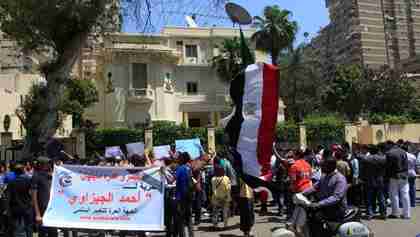 |
Saudi Arabia has recalled its ambassador to Egypt and ordered the temporary closure of its embassy in Cairo and consulates in Alexandria and Suez. This comes after hundreds of Egyptians have been demonstrating in front of the Saudi embassy in Cairo and attempted "to storm and threaten the security and safety of its employees of both Saudi and Egyptian nationality." They were protesting Saudi Arabia's arrest of Ahmed El-Gezawi on charges of having 21,000 pills of the anxiety drug Xanax in his luggage. The Egyptians are claiming he wasn't that anxious, but was arrested merely for insulting Saudi's King Abdullah. Saudi Arabia and Egypt have long had very close ties during the reign of Egypt's president Hosni Mubarak, before he was deposed by the Egyptian protesters early last year. Egypt is now in serious financial trouble, and Saudi last week agreed to send $2.7 billion to Egypt, so the current split sends a strong message to the Cairo government. Arab News and Reuters
I'm still waiting for the United Nations Syria "peace plan" to collapse completely, but former and current Secretaries-General Kofi Annan and Ban Ki-Moon keep making excuses for the Bashar al-Assad regime's continuing bloody slaughter of innocent Arab citizens. However, they've been getting less deferential in the last few days, and on Friday, Ban said Syria's repression of civilians reached an "intolerable stage" and demanded that the regime "live up to its promises to the world." This has triggered a furious response from the al-Assad regime. An editorial in the state-run newspaper on Saturday said that Ban has been making "outrageous" statements against the Syrian regime, and has ignored the "crimes and terrorist acts" of the opposition. Later Saturday, Syrian troops bombarded the Damascus suburb of Bakhaa with tank shells after a group of army defectors fled to the area from a nearby region, apparently to punish innocent civilians who had nothing to do with the defectors. AP
Analysts believe that North Korea's new child leader, Kim Jong-un, will have to do something fairly quickly to prove to everyone that he's capable of controlling a large army. This is particularly important to him now, after last week's spectacular humiliating failure of a long-range missile test. A new underground nuclear bomb test is almost a certainty, but there may be other provocations as well, specifically directed at what the (North) Korean Central News Agency (KCNA) the "rats" in the south, led by South Korean president Lee Myung-bak:
"The time has come when we should show in actuality the might of our armed forces to the Lee Myung-bak swarm of rats hell-bent on hideous wrongdoings, ... to bury those disgusting rats in the South Sea once a sacred war starts. Supreme Commander, please give us an order."
The "order" from Kim Jong-un might be to stage a surprise attack reminiscent of those two incidents in the Yellow Sea in 2010 - the sinking of the navy ship the Cheonan and the shelling of Yeongpyeong Island - which together killed 50 people. However, the reason that 2012 is different from 2010 is that now the South Koreans are fully prepared to retaliate if such an order is given. Asia Times
(Comments: For reader comments, questions and discussion,
see the 29-Apr-12 World View -- Saudi Arabia recalls ambassador to Egypt after massive Cairo embassy protests
thread of the Generational Dynamics forum. Comments may be
posted anonymously.)
(29-Apr-2012)
Permanent Link
Receive daily World View columns by e-mail
Donate to Generational Dynamics via PayPal
Switzerland considers paying illegal aliens to leave Switzerland
This morning's key headlines from GenerationalDynamics.com.
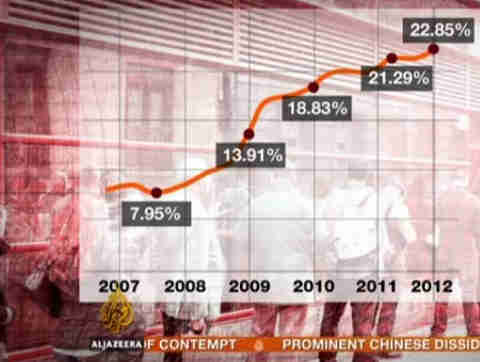 |
It wasn't exactly a surprise, but it was still shocking that Spain announced on Friday that unemployment had risen to 24.4% overall, with youth unemployment at 50%. On the same day, Standard & Poors ratings service lowered Spain's credit rating from A to BBB+, meaning that Spain will now have to pay more to borrow money. Analysts are saying that Spain's economy is spiraling downward out of control, and many politicians are blaming it on the "austerity" programs which they and other countries have been implementing in order to reduce their debt levels. But instead of reducing their debt levels, they're in a vicious spiral causing more debt from unemployment and higher borrowing costs. And all this has happened after the European Central Bank (ECB) has completed its LTRO program, where it "printed" €1.1 trillion since December and poured it into European banks particularly Spanish banks. As I've written many times, this is a problem with no solution except to face the greatest financial crisis in world history. As the bailouts get huger and huger, the problem is only being made worse, and the day of reckoning will be much harsher. Euskal Irrati Telebista (EITB, Basque Radio-television)
Under a controversial new proposal by the Swiss government, Switzerland would give $500 to $3000 to illegal aliens and asylum seekers to go back to their home countries, usually in northern Africa. The idea is being presented as a money-saving proposal, since it costs $150-350 per day for administrative detention, and $20,000-25,000 per person for "involuntary" deportation. According to one official, "Switzerland can save a lot of money and asylum seekers can get a new chance back in their home country and avoid being deported by force. We know that people who come here get into debt as they have to ask for help from their family and friends. Switzerland needs to give them some money to encourage them to make the step back home." Swiss Info
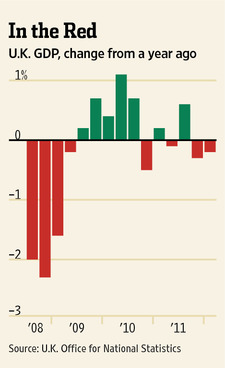 |
Britain unexpectedly fell back into recession in the first quarter of 2012, when gross domestic produce shrank 0.2%, after contracting 0.3% in the previous quarter. Since Britain was still trying to recover from a 2008-2009 recession, these two new quarters of negative growth officially mean that the UK is in a double-dip recession. Unemployment is at 8.3%, at the highest level since the mid 1990s. AP
It seems increasingly likely that Socialist Party candidate François Hollande will defeat Nicolas Sarkozy on May 6 to become the new president of France, and it appears that relations between Germany and France are going to become extremely rocky. European leaders, including German Chancellor Angela Merkel and Sarkozy signed a "fiscal austerity" pact in December, requiring states that receive bailout money to adhere to strict austerity and reform measures. 25 of the 27 EU member states signed the agreement with the UK and Czech Republic declining to do so. But Hollande has indicated that if he wins the French election, then he would demand changes to the agreement to reduce or eliminate the austerity and reform requirements. On Thursday, Merkel angrily indicated that the pact "cannot be renegotiated." Hollande replied:
"It is not Germany that will decide for the entirety of Europe. [If I win the election,] I will tell [Merkel] that the French people had made a decision that envisages a renegotiation of the pact."
Merkel has openly supported Sarkozy's reelection campaign, though there have been some recent signs that Merkel and Hollande are beginning to soften their rhetoric. Spiegel
Not just France, but also Greece is holding elections on May 6. Greece has had two huge bailouts so far, and is going to require a third. A caretaker government has been in charge since last year, but its approval rating has been falling. Greece is ahead of Spain in seeing its economy spiral downwards, and people are blaming it on austerity programs required by the Germans, and by illegal immigrants. Fringe parties are gaining popularity. The neo-Nazi group Golden Dawn is rising and stands to win seats in parliament, driven by its public appearances urging Greeks to empty the country of the 400,000 illegal immigrants they blame for crime, prostitution and other ills. Southeast Europe Times
A wave of public anger against plans for spending cuts and tax hikes caused Romania's center-right government to lose a confidence vote on Friday. The left-leaning opposition Social Liberal Union (USL) party will now try to form a new government. If USL rolls back some of the government's austerity measures, like wage cuts or sales tax increases, then the International Monetary Fund (IMF) may pull back on its plans for future bailout payments. The government in the neighboring Czech Republic barely survived an anti-austerity confidence vote on Friday. Some 90,000 people held protests last Saturday in the biggest demonstrations in the Czech Republic since the fall of communism in 1989, and union leaders said they planned further protests, including strikes before the end of June. Reuters
(Comments: For reader comments, questions and discussion,
see the 28-Apr-12 World View -- With 25% unemployment, Spain leads Europe in vicious downward spiral
thread of the Generational Dynamics forum. Comments may be
posted anonymously.)
(28-Apr-2012)
Permanent Link
Receive daily World View columns by e-mail
Donate to Generational Dynamics via PayPal
Analysts claim that North Korea's new missiles are fake
This morning's key headlines from GenerationalDynamics.com.
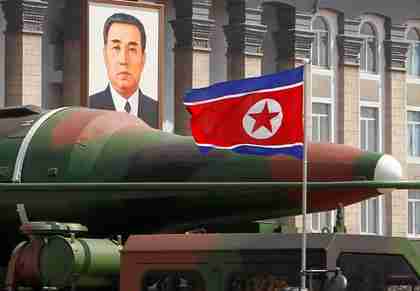 |
Analysts who have studied photos of a half-dozen ominous new North Korean missiles showcased recently at a lavish military parade say they were fakes, and not very convincing ones. The weapons displayed April 15 appear to be a mishmash of liquid-fuel and solid-fuel components that could never fly together. Undulating casings on the missiles suggest the metal is too thin to withstand flight. Each missile was slightly different from the others, even though all were supposedly the same make. They don't even fit the launchers they were carried on. AP
I often quote Debka reports because they have unique content based on intelligence sources not available elsewhere, since they have contacts within Israeli and American intelligence. However, in the past few years, they've predicted various military actions coming soon that never occurred. So you, Dear Reader, will have to be the judge of how much credibility to assign to this story.
According to Debka's subscriber-only newsletter (forwarded to me by a subscriber), Israeli intelligence believes that the window for an attack on Iran's nuclear facilities is closing very rapidly, and a decision must be made right away. Thus, if a decision is made to attack, then the attack will occur within the next few weeks. (The implication, not explicitly stated by Debka, is that if there's no attack within the next few weeks, then there'll never be an attack.) Israel has reached this conclusion based on intelligence that Iran has enough nuclear material already to construct a bomb, or at least a "dirty bomb," and that it would take only about six weeks to do so.
According to the Debka report, Iran would have several options to for attacking Israel, once they had a nuclear weapon. Some of these options are extremely dramatic:
"This scenario draws on the assumption that Iran may not yet have built a nuclear bomb capable of delivery by a ballistic missile, but has developed two cruder nuclear devices: One can be delivered by an airplane or a ship and the other is a radioactive or dirty bomb, which is cheaper and easier to make and can be used by Iran's proxy terrorists. ...The preparations Israel has put in train rest on the presumption that Tehran, in line with its avowed objective of destroying the Zionist state, is plotting to attack Israel with a crude nuclear device, regardless of whether or not the Netanyahu government decides to go to war on Iranian military nuclear facilities. To the world, Tehran would designate a prior attack "preemptive" and a subsequent offensive "retaliatory." ...
According to intelligence input - not just hypotheses - Iran's leaders have set their minds on a flash war, to be kept short by their nuclear resources. Neither missiles nor ground combat play a part in the Iranian scenario.
2. A lone civilian plane or ship carrying a large nuclear device would take off from Lebanon with Athens or Cyprus registered as its destination. Suicide air crews and frogmen, who have already completed specialist training courses, would detonate the device within 50-60 kilometers off the Israeli Mediterranean coast. ...
For the same exercise by sea, suicide frogmen would be dropped from small boats sailing out of Lebanon or Cyprus. They would drop their deadly nuclear cargo 50-60 kilometers off the Israeli shore and so menace its major urban centers, Tel Aviv, Netanyahu and Haifa.
This tactic would save Iran having to launch ballistic missiles or long-range bombers which might be intercepted by US or Israeli missile shields and challenged by Israeli Air Force warplanes.
3. Iran's strategists give high odds for their nuclear explosion at sea triggering a tsunami towering 50-60 meters high for inundating Israel's coastal plain, where the bulk of its population is concentrated. If it were detonated off Rosh Hanikra, they calculate the deadly waves would be hurled into Haifa Bay and flood Haifa and Acre (350,000 inhabitants) up to 42 kilometers (26 miles) inland, before crashing onto the Carmel Mountain range (500 meters high) and being washed back to sea.
This backwash would sweep up every object in its path and complete the destruction. The best-case scenario for the strategists in Tehran would be for a nuclear-triggered tsunami to deluge the most densely inhabited part of Israel and its financial and commercial heartland, the Tel Aviv conurbation. It might then roll on east and engulf a population of 2.9 million together with Israel's missile and nuclear centers, before smacking into the Jerusalem Hills (average height of 670 meters) at the town of Bet Shemesh and sweeping back.
Well, that's really dramatic -- dropping a nuclear weapon into the Mediterranean Sea to generate a tsunami to wipe out Israel. Debka
From the point of view of Generational Dynamics, the possibility of a preemptive nuclear strike by Iran, even if Iran had the capacity to do so, is unlikely, for several reasons.
First, as I've been writing for many years, Iran is basically a schizophrenic nation. Its top leadership, starting with the supreme leader, are survivors of the 1979 Great Islamic Revolution, an extremely bloody civil war. Like generational crisis war survivors in any country, these leaders imposed austere rules and institutions designed to prevent another bloody civil war, and this has led them to adopt a harsh anti-Western attitude. But the generations born after the crisis war have no such motivation, and Iran's younger generations are, in fact, generally pro-Western and have no particular desire to see Israel pushed into the sea. As months go by, people in these younger generations are displacing the war survivors, moving Iran's policies closer to the West. This change is occurring throughout society, even within the Islamic Revolution Guards Corps (IRGC). Thus, there would be enormous opposition within Iran's institutions to a preemptive strike, even if they had a nuclear weapons.
Furthermore, as I've described before, Iran takes pride in not having invaded other countries, even though other countries have invaded Iran. If you look back at Iran's major wars of the last century -- the Constitutional Revolution of the 1900s decade, the Great Islamic Revolution of 1979, and the Iran/Iraq war of the 1980s, Iran never attacked anyone else. This is now part of Iran's DNA, and even the top leadership would be repulsed by the idea of a preemptive attack on Israel.
Finally, I would remind long-time readers what I've been saying for years: That I expect Iran to be our ally, along with India, Russia and the West, in the Clash of Civilizations world war, opposing China, Pakistan and the Sunni Muslim countries.
What is far more likely is a preemptive attack by Israel on Iran. Israel is in a generational crisis era, and close to a state of full scale panic. In that case, Iran would feel free to respond in any way it could.
As we've reported several times in the last few months, Israel's trade relationships with Azerbaijan have been growing rapidly, and there have been unconfirmed reports that Azerbaijan will allow Israel to use its airbases on its border with Iran in an Israeli air strike on Iran's nuclear facilities. However, the Azeris have firmly denied these reports. In particular, President Ilham Aliyev stressed clearly that Azerbaijan will never participate in the military plans of other states against its neighbors. In fact, there are obvious reasons why it would be suicidal for Azerbaijan to grant Israel access to its territory for an attack on Iran:
(Comments: For reader comments, questions and discussion,
see the 27-Apr-12 World View -- How close is war between Israel and Iran?
thread of the Generational Dynamics forum. Comments may be
posted anonymously.)
(27-Apr-2012)
Permanent Link
Receive daily World View columns by e-mail
Donate to Generational Dynamics via PayPal
France calls for military action in Syria
This morning's key headlines from GenerationalDynamics.com.
 |
A new report charts terrorism and religious extremism in Pakistan, and finds that overwhelming the worst offenses are Muslims attacking Muslims. The report was prepared by the Jinnah Institute, a non-government organization (NGO) named after Mohammad Ali Jinnah, the founder of Pakistan.
By far the greatest number of casualties identified by the report -- 92.6% -- occurred because of sectarian extremism, most often Sunni-Shia clashes. This will not be a surprise to any long-time readers of my web site, as I've reported many stories of al-Qaeda or Taliban linked Sunni extremists blowing up Shia, Sufi or Ahmadi pilgrims and mosques, with the objective of killing as many of the "apostates" as possible. There was very little violence attacking Christians.
The report concludes with worrying developments:
"Three developments are most worrying for Pakistan. First, the widespread acceptance of Al Qaeda’s anti-West stance has permeated large swathes of the population. Second, the US policy of targeting Al Qaeda and its affiliates through drone strikes has forced its leaders to spread out and find new operational bases with- in urban Pakistan. Karachi, for instance, has been cited as a major ground for the continuation of its operations, in addition to Faisalabad, Lahore and other areas. Third and most dangerously, in the past decade, Al Qaeda may have entered into an alliance with home-grown militants such as the Tehreek-e-Taliban Pakistan (TTP) and sectarian outfits such as Lashkar-e-Jhangvi (LeJ) and Jaish-e Mohammad."
From the point of view of Generational Dynamics, Pakistan and India are headed for a major new war, re-fighting the genocidal war that followed Partition, the 1947 partitioning of the Indian subcontinent into India and Pakistan. Historically, dating back almost to the time of Mohammed, Hindus have been allied with Shia Muslims against Sunni Muslims, and so it's expected that Iran will be allied India and the Shia Muslims in Pakistan and in northern Afghanistan, while Pakistan's Sunni Muslims will be allied with the Pashtuns in Afghanistan. Jinnah Institute
The historical patterns identified by Generational Dynamics are universal, and apply to all nations at all times in history. So I was startled to read the analysis of Pakistan's Blasphemy Laws in the Jinnah Institute report.
According to the report, the Blasphemy Laws were introduced in 1927 by the British. But in 1986, General Zia-ul-Haq modified the laws to specify harsh punishment, including life imprisonment and the death sentence, for "derogatory remarks, etc., in respect of the Holy Prophet ... either spoken or written, or by visible representation, or by any imputation, innuendo or insinuation, directly or indirectly ...." Thousands of people have been charged with blasphemy since 1986. There was an initial surge against Christians and Ahmadis, but the vast majority have been charges made by Muslims against other Muslims. However, instances where Muslims have burned a cross, demolished or damaged churches, desecrated graves or defiled the Bible in front of witnesses, have gone unprosecuted by police and legislators.
Muslims have been kept in jail for years for violating blasphemy laws, and a number of people accused of blasphemy have been killed by vigilantes. What's remarkable is that there are no voices in Pakistan speaking out against this irrational, violent behavior.
"With the exception of the English print media, mainstream media in Pakistan has not engaged in meaningful debate on the validity of the Blasphemy Laws under the Quran and Islamic teachings. It has largely failed to analyze and present to the public the details of the law, including potential for misuse and abuse. It has underreported, and reflected a bias when reporting cases of persecution of religious minorities. ...The volatility of the blasphemy issue and the media’s implicit condoning of extremist ideologies and actions have led to a largely one-sided public discourse. The violent tactics used with impunity by the religious right and the subsequent cowering of the state have proliferated an atmosphere of fear and silenced dissenters. The silence can also be partly attributed to widespread ignorance of the law and the extent of its basis in Islamic scripture. Online forums indicate that some people are reluctant to object to Blasphemy Laws because their own religious sensibilities are offended by the act of blasphemy, so even when undecided about the validity or suitability of the laws, they tend not to challenge them. Thus the public discourse seems to focus on how the act of blasphemy is wrong, as opposed to a conversation on what constitutes blasphemy; what examples of blasphemy and its punishment exist in Islamic texts; the actual laws in the PPC and their misuse; and murder and vigilantism support for which negates the necessity of the law in the first place."
In other words, we have people being jailed, tortured and killed for irrational reasons, with ordinary Pakistanis refusing to speak out against it.
This is exactly the kind of behavior that I've been describing in Generation-Xers in America, where thousands of Gen-X financial engineers created the financial crisis with the purpose of defrauding hated Boomers, and no banksters are being investigated and tried because Gen-Xers refuse to blame other Gen-Xers for anything, even serious crimes. It's this refusal to blame other Gen-Xers for crimes that characterizes this generation today, and it's exactly the same kind of behavior we're seeing in the Pakistani population today.
As I explained in "The Legacy of World War I and the Holocaust", this is also the same behavior that led to the 1930s Holocaust. Germany's Lost Generation (the generational predecessor of today's Generation-X) hated the previous Missionary Generation just as much as today's Gen-Xers hate the previous Boomer Generation.
These situations occur in all times and places throughout history, and result in history's greatest catastrophes. In each case, the generational conflict morphs into a political conflict, as people in every generation are forced to choose sides in the generational debate. In 1930s Germany, it was the Christians blaming the Jews for German humiliation in World War I. In America today, it's the Democrats versus the Republicans for the Nasdaq crash in 2000.
What I don't yet know is how it worked in Pakistan. What I can say for sure is that the generation that grew up following the 1947 Partition war is hated by the generation that grew up in the 1960s and 1970s in Pakistan, but I don't know why, and I don't know why this has morphed into a political split making it OK to arrest, torture and kill any Muslim who accidentally says something wrong about the prophet Mohammed. These are subjects that will require additional research.
As the farcical Kofi Annan "peace plan" continues to be used by Syria's president Bashar al-Assad as a shield to allow him to exterminate as many innocent Arabs as possible, as if they were cockroaches, France is raising the possibility of military intervention. France's Foreign Minister Alain Juppé said on Wednesday that the Annan peace plan was "severely compromised," and that France might invoke Chapter 7 of the U.N. Charter, which can be enforced militarily, with other world powers. In making this statement, Juppé is moving toward the U.S. position previously suggested by Secretary of State Hillary Clinton. However, any such resolution presented to the U.N. Security Council is certain to be vetoed by China and Russia. China will veto it because they want to continue to have a free hand in slaughtering Tibetans and Uighurs. And Russia will veto it because Syria's situation gains them a naval port in the Mediterranean, and it makes them a lot of money selling weapons to the Syrian regime for use in massacring civilians. AP
(Comments: For reader comments, questions and discussion,
see the 26-Apr-12 World View -- New report examines terrorism and religious extremism in Pakistan
thread of the Generational Dynamics forum. Comments may be
posted anonymously.)
(26-Apr-2012)
Permanent Link
Receive daily World View columns by e-mail
Donate to Generational Dynamics via PayPal
Syria's Circassian refugees add to Russia's problems in the Caucasus
This morning's key headlines from GenerationalDynamics.com.
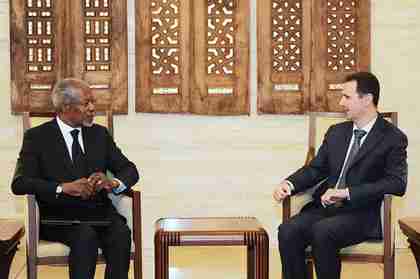 |
Former U.N. Secretary-General Kofi Annan told a closed session of the U.N. Security Council on Monday that his six-point peace plan for Syria was failing. According to a spokesman, Annan pointed to two specific issues:
Last week I quoted a Syrian activist who claimed that the Kofi Annan peace plan not only would not accomplish anything, but was actually making things much worse for the Syrian people, and now we see this happening. In the run-up to the date when the "truce" was to have taken place, the regime's tanks and snipers redoubled their slaughter of innocent Arab citizens in their residential neighborhoods, massacring as many people as possible prior to the "truce." Then, after the "truce" took effect, watching the U.N. observers provided a convenient way to know who to torture and slaughter next. As anyone could see, the Kofi Annan peace plan was never more than an stalling maneuver by Russia, China and Syria to allow al-Assad to continue to slaughter his people unfettered while Russia, in particular, trades the blood of innocent Arabs for economic gains and a Mediterranean port. Reuters
The beautiful Black Sea resort of Sochi is the site of Russia's 2014 Winter Olympics games. It's also the site of the the 1864 massacre by the Russians of the ethnic Circassians, making 2014 the 150th anniversary of the massacre. Russia's North Caucasus provinces, including the region surrounding Sochi, are being increasingly plagued by radical Islamist violence. The massacre going on in Syria has added a new complication. During the 1864 massacre, many Circassians fled to Syria, and there are now between 80,000 and 100,000 Circassians living in Syria, mostly living in Damascus, Aleppo and Homs. Circassians lived in 11 villages around Homs, but all of them have become refugees, because they've been targeted by the Bashar al-Assad regime. Members of the Syrian Circassian community have been kidnapped, threatened and tortured. The situation in the city of Homs, where Circassians used to reside in substantial numbers, was characterized by famine and an absence of medical assistance. Thus, there is pressure in Russia to repatriate the Syrian Circassian refugees back to Russia. However, some experts are saying that repatriating them would further destabilize the North Caucasus, while other experts say that ignoring the plight of the Syrian Circassians would infuriate many in the North Caucasus, also risking destabilization. Jamestown
 |
The Netherlands' liberal prime minister Mark Rutte was forced to resign on Monday after he lost a part of his governing coalition. The crisis was triggered when Rutte's far-right parliamentary ally, the Freedom Party led by Geert Wilders, walked out of budget negotiations designed to reduce the country's deficit. Wilders has become well-known for his widely criticized campaigns against Islam and Muslims, as well as being an arch "euroskeptic." Wilders refused to endorse the new austerity measures, saying that Brussels was "stealing money from the wallets of the poor," and, "We won’t let our pensioners suffer for the Brussels dictators."
It's ironic that the Netherlands, along with Germany, has been one of the leading critics of the profligacy of Greece and the southern European countries, and has been leading the demand for further austerity in those countries. It will be quite humiliating if Holland now fails to pass its own austerity program. Furthermore, Holland is one of the few European countries left with an AAA credit rating, and failure to pass the austerity measures would probably cause it to lose the rating, raising the costs of borrowing money in the future. AFP
One government after another has been collapsing in Europe, as voters blame their political leaders for financial crisis, and for forcing them to accept austerity programs to reduce the national deficits. Ireland, Greece and Italy all faced brutal government collapses over austerity. In France, Nicolas Sarkozy is expected to lose in the second round of presidential elections on May 6 to Socialist François Hollande. And now, the Netherlands' government has collapsed. All sorts of agreements -- the bailout of Greece, the creation of the bailout funds, the proposed adoption of "fiscal pacts" -- were accomplished by a group of national leaders who are disappearing, putting the agreements themselves in danger. To matters worse, the EU government in Brussels is practicing anything but austerity, with the European Commission demanding a 7% increase in its own budget. Telegraph
Greece's economy will contract a deeper than expected 5% this year, worse than the previous forecast of 4.5% made in March. On Tuesday, George A. Provopoulos, the head of the Bank of Greece said that it's necessary for Greece to continue its austerity program, and to implement even deeper austerity measures:
"What is at stake is the choice between:An orderly, albeit painstaking, effort to reconstruct the economy within the euro area, with the support of our partners;
or
a disorderly economic and social regression, taking the country several decades back, and eventually driving it out of the euro area and the European Union."
(Comments: For reader comments, questions and discussion,
see the 25-Apr-12 World View -- Collapse of Netherlands' government signals backlash against austerity across Europe
thread of the Generational Dynamics forum. Comments may be
posted anonymously.)
(25-Apr-2012)
Permanent Link
Receive daily World View columns by e-mail
Donate to Generational Dynamics via PayPal
Tensions continue to rise in the South China Sea
This morning's key headlines from GenerationalDynamics.com.
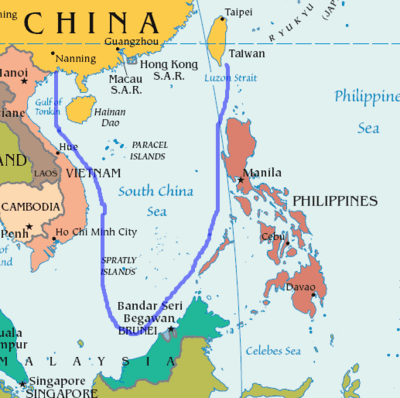 |
I've been writing for several years about China's increasingly aggressive activities in claiming as under its "indisputable sovereignty" over islands and "related waters" in huge regions of the South China Sea, including islands that have formerly been part of the Philippines, Vietnam, Malaysia, Taiwan and Brunei. A new report by the International Crisis Group details the history of the controversy, and its importance to the world economy.
In fact, 10% of the entire world's fisheries catch takes place in the South China Sea, making the region vitally important to the economies of all the nations around it. As China has become more aggressive in asserting its claims, the neighboring countries have been scrambling to bolster their own claims, by occupying as many of the features as possible. This has led to a series of maritime incidents, beginning in 1974 with a standoff between China and Vietnam. But the number of incidents has increased dramatically in the last two years, including the latest incident between China and the Philippines over Scarborough Shoal, an island off the coast of Manila and far from China's shores.
Like many nations in the world, China is becoming increasingly nationalistic. This can take many forms, but in China it's taking the form of demands for sovereignty over lands controlled by India, Russia, and Japan, in addition to those in the South China Sea. This desire for land, similar to Hitler's demands for Lebensraum, is substantially increasing tensions in the region to the point where a miscalculation or misunderstanding on someone's part could lead to military action.
According to the report, the situation in China is substantially complicated by the fact that numerous Chinese government and semi-government agencies are competing with one another to be the heroes in the South China Sea.
There's a bulky bureaucracy that includes eleven ministerial level government agencies, under which there are five law enforcement agencies and private actors. The most active of these eleven actors include the Bureau of Fisheries Administration, China Marine Surveillance, the local governments, the People's Liberation Army Navy (PLAN), and the foreign ministry. China's government has deliberately imbued the maritime disputes with nationalist sentiment. In current textbooks, the map of China includes the South China Sea and China's claims.
According to the report, netizens and nationalists have long called for Beijing to step up military deployments in the region to “teach the Vietnamese, the Filipinos and Malaysians a good lesson." Many have expressed a desire for the South Sea Fleet to repeat the 1974 and 1988 “victories” and send the Vietnamese “home with tails between their legs." Most nationalist scholars and netizens are ardent supporters of a maximalist view of Chinese claims, calling “not to forget the 3 million sq km of Chinese maritime territory” and arguing that “the size of Chinese territory should be 12.6 million sq km, not 9.6 million." International Crisis Group
 |
Geir Haarde, 61, who was prime minister of Iceland between 2006 and 2009, was acquitted on Monday of charges of gross negligence in failing to prepare for the financial crisis, but was found guilty of failing to hold emergency cabinet meetings in the run-up to the crisis, though he won't go to jail for that.
This whole situation is incredibly vomit-worthy on so many levels. Guilty of "failing to hold emergency cabinet meetings"?? Are you kidding me?
During the trial, Haarde said,
"None of us realized at the time that there was something fishy within the banking system itself, as now appears to have been the case."
Well, so Haarde didn't know. And neither did Gordon Brown, who was Britain's Chancellor of the Exchequer and then Prime Minister during this period. And of course neither did that brilliant economist Paul Krugman, who won a Nobel Prize in economics because of his hatred of George Bush, and who said in 2008, "Who knew that Iceland was going to have a financial collapse? Who knew?"
So none of these people knew that there was "something fishy," but I knew.
In February 2006, I wrote about the possible default of Iceland's banks in "Sudden collapse of Iceland krona portends bursting of 'carry trade' bubble." In that article, I described how Fitch Ratings was revising the outlook for Iceland's banks from "stable" to "negative," saying that the new ratings "[took] into account Iceland's macro-prudential risks, including rising inflation, rapid credit growth, buoyant asset prices, a steep current account deficit and escalating external indebtedness."
I wrote later articles on the subject as well. So I knew, but Haarde didn't know, Brown didn't know, and Krugman didn't know. That's just great.
So Haarde got off by claiming ignorance of something that he should have known, and probably did know, which means he was lying. But it's just as well, because Haarde was just the scapegoat of a lot of politicians who lied and accused him to save their own butts. And as I've said many times, no one is prosecuting the thousands of Gen-X banksters who purposely committed illegal acts, because Gen-Xers refuse to blame each other for anything, even serious crimes, with the result that the same people are in the same jobs committing the same kind of fraud, only worse, paying themselves the same huge bonuses to do so. Irish Times
(Comments: For reader comments, questions and discussion,
see the 24-Apr-12 World View --
thread of the Generational Dynamics forum. Comments may be
posted anonymously.)
(24-Apr-2012)
Permanent Link
Receive daily World View columns by e-mail
Donate to Generational Dynamics via PayPal
Russia and China conduct military exercises in Yellow Sea
This morning's key headlines from GenerationalDynamics.com.
 |
François Hollande (Socialist Party) has won the first round of France's presidential election, with around 28% of the vote. Incumbent president Nicolas Sarkozy (Centre Right UMP party) came a close second with almost 27%. Here are the results for all ten candidates:
Latest official results for all candidates:
François Hollande (Socialist Party) 28.10%
Nicolas Sarkozy (Centre Right UMP party) 26.98 %
Marine Le Pen (National Front (Far Right)) 18.76%
Jean Luc-Melenchon (Far-Left) 10.89%
François Bayrou (Centre) 9.19%
Eva Joly (Green) 2%
Nicolas Dupont-Aignan (Right, Eurosceptic) 1.8%
Phillippe Poutou (Far Left) 1.2%
Nathalie Arthaud (Far Left 0.7%)
Jacques Cheminade (Independent) 0.2%
There will be runoff election on May 6 with just two candidates Hollande and Sarkozy.
The big surprise was the big turnout for far right candidate Marine Le Pen, almost 20% of the votes, far higher than predicted. Exit polls indicate that Le Pen captured the youth vote, with 48% of her supporters between the age of 25-44. The same study showed that Le Pen supporters said immigration and insecurity were their top concerns, whereas Sarkozy backers said the financial crisis was France’s most pressing problem. Many of Le Pen's voters dislike Sarkozy and believe that he betrayed them, after promising "hope and change" in his first election, and so many of them will not for him, or not vote at all on May 6. On the other hand, the supporters far left candidate Jean-Luc Mélenchon, with 11% of the vote, are all expected to vote for Hollande, making Hollande the likely victor on May 6. France 24
French National Front party candidate Marine Le Pen did not win the election, but with almost 20% of the vote, her concession speech sounded almost like a victory speech:
"With honour, courage and dignity the French have defied all expectations and invited themselves to the table of the elite tonight. This first round is not an end in itself but the beginning of a huge coming together of patriots both left and right who love France. The battle for France has only just begun. Dear friends, dear French friends, nothing will ever be the same again. Together we have blown apart the monopoly of the two parties of the banks, of finance, of multinationals, of giving up and abandoning. We have carried the national ideal higher than ever before. We are now the only true opposition to a left that is ultra liberal, and lax."
The incumbent Nicolas Sarkozy actually did fairly well on Sunday, only about a point behind the leader, Socialist candidate François Hollande. His supporters were delighted with this result, as pundits had been predicting a much poorer performance. Sarkozy's post-election speech was defiant, referring to the runoff election in two weeks:
"The French have expressed a crisis vote, one that testifies to their worries, their suffering and their anxiety faced with this new world which is taking shape. I understand these anxieties, this suffering. It concerns the respect of our borders, the battle against companies relocating abroad, it’s about controlling immigration, valuing jobs, protecting families. I know that in a fast moving world, our compatriots are worried about preserving their way of life and that is the central question of this election.The coming two weeks must enable each and everyone of you to make a clear choice. Everything must be debated, without hypocrisy, without ducking, without equivocation. That is why I suggest three debates should be organised between the two candidates on the themes of the economy, on questions of society and on foreign policy. The French have a right to truth and clarity."
Commentators say that Sarkozy is unlikely to get his wish of three debates with Hollande, but there will probably be one or two debates. EuroNews
Socialist candidate François Hollande gave a victory speech referring to Sarkozy as "the outgoing candidate," and promising changes.
It's going to be interesting to see how the dynamics of European politics changes after a Hollande victory. In the past few months, German Chancellor Angela Merkel and some other national leaders have openly supported Sarkozy and snubbed Hollande, in an effort to help Sarkozy win. It will be interesting to see how Hollande gets along with these leaders if he wins.
Hollande has promised more substantive policy changes, many of which are similar to those of President Obama. Euphemistically, Hollande has promised "growth" rather than "austerity." France, Germany, the European Central Bank (ECB) and the International Monetary Fund (IMF) have all be preaching austerity -- reducing deficits and debt levels. But Hollande is promising to pump money into the economy to promote growth, even if it means a substantial increase in public debt, as has happened in the United States. However, there's a big difference in that France is only one of 17 countries in the eurozone, and there are plenty of countries, led by Germany, that will expanding public debt further.
As I've written many times, Europe's economy is unraveling, with a financial collapse a certainty. So from the point of view of Generational Dynamics, it makes little difference whether Sarkozy or Hollande wins on May 6. However, a Hollande victory could change European political dynamics in a way that will at least be interesting to watch. Euro News
While Greece has been cutting the salaries and pensions of civil servants in the last couple of years, the country has been on a weapons buying binge that makes it one of the biggest weapons importers in the world. Military cuts have been exempt so far from austerity budget cuts, but that may have to change in the next round of cuts to be made this summer. However, there remains a great deal of political pressure not to cut the military budget for the following reasons:
Two submarines, five missile destroyers, five missile frigates, four missile boats, a support vessel and a hospital ship from the Chinese navy, along with 13 aircraft and 4,000 Chinese servicemen, will conduct six days of military exercises to improve regional stability, according to an announcement by China. They will be joined by a Russian naval task force on Saturday. The military exercises come at a time when China is aggressively claiming complete sovereignty over islands in the South China Sea that historically had belonged to Philippines, Vietnam, Malaysia, Taiwan and Brunei. They also come at a time when the United States and the Philippines are conducting their own joint military exercises. China's army newspaper warned that the U.S.-Philippines exercises could lead to and armed confrontation over the disputed South China Sea. Manila Standard
(Comments: For reader comments, questions and discussion,
see the 23-Apr-12 World View -- Far-right candidate Marine Le Pen becomes kingmaker in France's elections
thread of the Generational Dynamics forum. Comments may be
posted anonymously.)
(23-Apr-2012)
Permanent Link
Receive daily World View columns by e-mail
Donate to Generational Dynamics via PayPal
The wild card: Turkey
The United Nations Security Council (UNSC) on Saturday voted unanimously to authorize up to 300 unarmed military observers to travel to Syria and try to bring about compliance with the peace plan proposed by former U.N. Secretary General Kofi Annan, according to CNN. Their mandate is for 90 days.
 |
Ironically, the relative positions of Russia and the West are somewhat reversed from where they have been in the past. Previous Security Council resolutions on Syria were vetoed by Russia and China, because they criticized Syria's president Bashar al-Assad and threatened sanctions.
China has been supporting al-Assad's massacre of unarmed demonstrators because China doesn't want anyone criticizing them of massacring Tibetans and Uighurs. Russia has been supporting al-Assad's massacre of unarmed demonstrators because they make a lot of money selling weapons to Syria, because they've used the opportunity to strengthen their naval base off Syria's coast, and because they've been able to demand that al-Assad give the Russians control of Syria's oil and gas fields, as we've recently reported. (See "21-Apr-12 World View -- Russia's relationship with Syria deepens as the West dithers") Russia and China apparently now believe that they have a free hand in doing what they want with Syria, since they're convinced that the West will do nothing to stop the Syrian slaughter.
So Russia and China have vetoed UNSC resolutions on Syria in the past, but they're leading the way in supporting the new resolution because it's so weak, and because it will permit al-Assad to continue his slaughter unfettered. Russia Today quotes Vitaly Churkin, Russia's U.N. ambassador, as saying:
"In fact we are very pleased with the outcome of today’s vote, which happened less than two hours ago. It was Russia who took the initiative in introducing the draft yesterday morning. And it took us just 26 hours to bring it to fruition, to the unanimous vote of the Security Council on a rather complex resolution, both politically and technically, no mean feat by Security Council standards, let me tell you.But the most important thing is what is going to happen next. Of course, we hope that the monitors are going to be deployed expeditiously. The mandate is very carefully outlined, so it’s very clear both for the monitors what they are expected to do, to the government and the opposition what they are expected to do for the monitoring mission to be successful, both in terms of allowing them to get objective information and in terms of making sure that they operate in an environment of safety and security.
It is also very important that the mandate provided for the monitors in the resolution is fully in line with the understandings which have been reached between the UN secretariat and the Syrian government.
So we are very encouraged that we may be on the right track. And there are some positive indications on the ground as well. Because for instance today the foreign minister of Syria sent a letter to Mr Kofi Annan in which he says that the Syrian government has complied, has implemented one of the very important provisions of the Kofi Annan plan: the provision about pulling out heavy weapons and troops from the cities and from around of cities."
The resolution that was adopted was supposedly a compromise between the Russian and Western positions, but it seems to me at least that Russians got their way on the key issues. Here are the main areas of disagreement, and how they were resolved:
A compromise was worked out that U.N. Secretary-General Ban Ki-Moon will assess the situation on a continuing basis, and decide when the monitors will be introduced. But the question of transport is open.
Britain's foreign secretary, William Hague, welcomed the resolution, according to the Guardian, but did not express confidence that it would succeed:
"I remain extremely concerned that the Syrian regime is still failing to meet its commitments, and that there has been further violence and the use of heavy weapons since 12 April when a ceasefire should have come into effect.The Syrian regime must stop immediately troop movements towards population centres; end the use of heavy weapons in civilian areas; and withdraw the military to their barracks. The Syrian regime must ensure that the UN monitoring mission can operate freely and safely, and this must include agreement on the use of air assets."
That's simply not going to happen. Al-Assad will NOT stop using heavy weapons in civilian areas, and will NOT withdraw the military to their barracks. America's U.N. Ambassador Susan Rice appeared visibly angry in the televised session over the passage of such a weak resolution. Referring to the 90-day mandate in the resolution, AFP quotes her:
"Our patience is exhausted. No one should assume that the United States will agree to renew this mission after 90 days."
She indicated that the U.S. won't wait three months to pursue other courses of action if there's no "meaningful progress." However, such statements have turned out to be empty threats in the past.
Churkin, the Russian envoy, called Rice's remarks "unhelpful." "Making negative predictions sometimes looks like a prophecy which some people want to be borne out."
Turkey did not participate in the Saturday's UNSC meeting, but holds the key to whatever action might be taken in the future. Turkey does not need UNSC approval for military intervention in Syria, because the legal basis for intervention is already provided by the "Adana Agreement," signed by Turkey and Syria in Adana, Turkey, on October 20, 1998, as we've recently reported.
Turkey has remained very reluctant to proceed further, but as thousands of Syrian refugees continue to pour across the border, they may decide that they have no choice. According to Bloomberg, U.S. Secretary of State Hillary Clinton has said that Nato-member Turkey may invoked the Nato charter provision that says that an attack on one is an attack on all. So there is still a possibility of a Nato-led military action into Syria, bypassing the UNSC, but it remains to be seen whether such action will ever be taken.
From the point of view of Generational Dynamics, Syria is in a generational Awakening era, during which a crisis civil war is impossible, or if a civil war starts, then it will fizzle fairly quickly. Despite the fact that pundits continually express fear of a full-scale civil war in Syria, it's quite possible that Syria has already seen the worst of its sectarian violence. If the war fizzles out soon, then Kofi Annan and Russia can take credit for bringing peace to the Mideast.
(Comments: For reader comments, questions and discussion,
see the 22-Apr-12 News -- Russia and West agree on Syria resolution, but disagree on details
thread of the Generational Dynamics forum. Comments may be
posted anonymously.)
(22-Apr-2012)
Permanent Link
Receive daily World View columns by e-mail
Donate to Generational Dynamics via PayPal
France and Germany demand right to close borders with other EU countries
This morning's key headlines from GenerationalDynamics.com.
 |
Dressed in a leopard skin and carrying a Zulu spear of the type that was used by Zulu warriors led by Shaka to exterminate millions of indigenous Africans in the Mfecane war of the 1820s, Jacob Zuma, the president of South Africa, got married for the sixth time on Saturday. According to the official statement, "President Jacob Zuma has today, 20 April 2012, married Ms Bongi Ngema at a traditional ceremony known as umgcagco at his home in Nkandla, KwaZulu-Natal." Zuma has been married six times, but one wife divorced him and another committed suicide, leaving the 70-year-old Zuma with a mere four wives. AFP
The European Union and the euro currency were both adopted because survivors of World War II wanted a way to guarantee that Europe should never again experience horrors like the two world wars. A critical symbol of European unity is the Schengen agreement, signed in 1995, allowing the EU citizens to travel freely from one country to another without a visa. But now, France's interior minister Claude Gueant and Germany's interior minister Hans-Peter Friedrich are joining hands to call for countries to have to right to close borders for 30 days at a time when conditions warrant. Opponents are saying that this must be a joke, since ending the Schengen agreement would lead to the demise of the European Union. In fact, Denmark closed its borders with Germany last year, in the midst of the war in Libya, when illegal immigrants were flowing from northern Africa into Italy and, from there, into other EU countries. (See "6-Jul-11 News -- Denmark's border controls called a 'European crisis'") Since then, Greece's porous border with Turkey has led to calls for more border closures. Opponents of the new proposal point out that "Illegal immigrants usually don't go via the border checkpoint anyway, so controls wouldn't make any sense." Deutsche-Welle
 |
An apparent "flash crash" occurred on India's National Stock Exchange (NSE) on Friday, when the "Nifty Futures" index fell 6.7% within a few seconds. The index recovered most of the loss, and closed down 0.96% at the end of the day. However, the sudden plummet was reminiscent of the May 6, 2010, flash crash that occurred on the New York Stock Exchange, with the S&P 500 index falling about 8% before recovering. In both cases, the cause was computerized algorithm trading, also called "high frequency trading" (HFT), where computer programs are designed to sell when they sense the market is falling, thus potentially causing a computerized stock market panic. However, the NSE claims that nothing out of the ordinary happened on Friday, despite the sudden 6.7% fall. Business Standard (Mumbai) and Reuters
Political violence was introduced to Karachi in the mid-1980s by the Muhajir Qaumi Movement (MQM), which emerged as the ethnic party of the muhajir, refugees from the Muslim-majority areas of the British India in 1947. It was renamed in the late 1990s as the Muttahidda Qaumi Movement (MQM - United National Movement), when a subgroup, the MQM-Haqaqi split off, resulting in bitter violence. In the 2000s, large numbers of Pashtun/Taliban tribesmen migrated to Karachi, resulting in more violence. Today, Karachi is one of the most violent cities in the world where at least 396 persons have lost their lives in ethnic, sectarian, and political violence in the first three months of 2012. Forty-seven of these murders were targeted killings while 24 of them were political and ethnic killings. The growing violence and subsequent chaos in Karachi has paralyzed the Pakistani security forces and created a vacuum which is being filled by Islamists, a situation that became abundantly clear in May 2011, when Tehrik-e-Taliban Pakistan (TTP) attacked the Mehran naval base in Karachi with impunity. Jamestown
(Comments: For reader comments, questions and discussion,
see the 22-Apr-12 News -- Russia and West agree on Syria resolution, but disagree on details
thread of the Generational Dynamics forum. Comments may be
posted anonymously.)
(22-Apr-2012)
Permanent Link
Receive daily World View columns by e-mail
Donate to Generational Dynamics via PayPal
Nicolas Sarkozy faces reelection battle in France on Sunday
This morning's key headlines from GenerationalDynamics.com.
 |
Hundreds of thousands of protesters filled Tahrir Square in Cairo, Egypt, on Friday, in the biggest demonstration in many months. When the "Egyptian Revolution" began in January of last year, protesters were united in wanting the ouster of president Hosni Mubarak. After Mubarak was deposed, the opposition groups began to splinter into groups -- the Muslim Brotherhood, Salafists, Liberals and 6 April Youth Movement -- with differing agendas, with each group holding demonstrations from time to time. But now all the groups are united again, after it's becoming increasingly clear that the ruling Supreme Council of the Armed Forces (SCAF) has no apparent intention of giving up power. Their common demand is the SCAF give up control to a civilian government. Bikya Masr (Cairo) and Al-Ahram (Cairo)
Russia has become the principal defender and supporter of Syria's president Bashar al-Assad, as he continues to massacre his own innocent Arab people after signing a "peace agreement" to buy time. Russia's motives are becoming clearer, now that they've become increasingly convinced that the West will do nothing to intervene in the slaughter. Safe from Western intervention, Moscow is now deploying naval warships on the Syrian coast on a permanent basis. Moscow has exacted a big economic price from al-Assad in return for its full-throated support. In particular, Russia's state-owned energy firm Gazprom is taking control of Syrian oil and gas fields worth billions of dollars. By cynically demanding economic favors in exchange for supporting al-Assad's massacre, Russia is showing contempt for Saudi Arabia and Qatar, who are quite vocal in saying that al-Assad must step down to stop the massacre. Jamestown
Polls are indicating that Socialist candidate François Hollande is likely to defeat the incumbent right-of-center Nicolas Sarkozy for the Presidency of France. However, it's not completely clear how the two-part election will turn out. Voters will be able to select from ten different candidates on Sunday, making it very unlikely that any one candidate will get a majority of the vote. The two candidates who get the most votes -- almost certainly Nicolas Sarkozy and François Hollande -- will stand in a runoff election on May 6, to decide the final victor. Sarkozy is complaining that his poll ratings have suffered because all nine of the other candidates are attacking him, and he believes that he'll do better in the runoff election, when only one other candidate is attacking him. France 24
(Comments: For reader comments, questions and discussion,
see the 21-Apr-12 World View -- Russia's relationship with Syria deepens as the West dithers
thread of the Generational Dynamics forum. Comments may be
posted anonymously.)
(21-Apr-2012)
Permanent Link
Receive daily World View columns by e-mail
Donate to Generational Dynamics via PayPal
India tests a long-range missile that can reach Beijing
This morning's key headlines from GenerationalDynamics.com.
 |
The regime of Syria's president Bashar al-Assad continues to massacre innocent Arabs as if there had never been a "Kofi Annan peace treaty." Few people doubt that al-Assad agreed to the "peace treaty" simply to buy time, so that he could continuing his slaughter, but U.N. Secretary-General Ban Ki-Moon is pressuring al-Assad with new terms in order to force him to end the violence. Unfortunately, al-Assad is quite skilled in sabotaging any such attempt. Here are the points of discussion:
In the case of the Arab League observer mission in January, there were only 25 observers, and the group was headed by a general from Sudan who had previously overseen genocidal acts. Al-Assad will try to sabotage the current observer mission so that it will be as much of a fiasco as the Arab League mission was. AP
Syria has produced large stockpiles of chemical weapons over the past few decades, including mustard gas, sarin, and possibly VX nerve agent. They're thought to be stored in some 50 stockpiles around the country. Al-Assad is protecting them for use as a last-ditch attempt to stave off overthrow. Syria is one of a few countries that never signed the Chemical Weapons Convention. Even if it had, the possibility of a sudden fall of the al-Assad regime would leave the country with no clear ruler, and no easy way to control these stockpiles. CS Monitor
India said Thursday that it had successfully carried out a test of a long-range missile, capable of carrying a nuclear warhead over 5,000 km, putting Chinese cities like Beijing and Shanghai within range. However, a great deal more testing will be required before the capability can be fully deployed. It's believed that the United States, China, Russia, Britain and France are the only nations to date that have developed this technology. At a State Department press conference in Thursday, the U.S. refrained from criticizing India for developing this technology, drawing a clear distinction between India's intentions and North Korea's intentions. North Korea had a failed long-range missile test last week. CNN and Times of India
(Comments: For reader comments, questions and discussion,
see the 20-Apr-12 World View -- Syria and U.N. disagree on implementation of observers
thread of the Generational Dynamics forum. Comments may be
posted anonymously.)
(20-Apr-2012)
Permanent Link
Receive daily World View columns by e-mail
Donate to Generational Dynamics via PayPal
MSNBC's Chris Matthews puts forward a formula for governing
This morning's key headlines from GenerationalDynamics.com.
 |
The case of George Zimmerman, the Latino/white who shot and killed a young black man, Trayvon Martin, in Florida has gained national and even international attention because Zimmerman avoided arrest for several weeks because of a Florida "stand your ground" law that permits a man under attack to use a gun in self-defense. On Wednesday, Judge Jessica Recksiedler recused herself from the case, because of a conflict of interest involving her husband.
Back in the mid-2000s, people on the left used to wonder why not college students were out protesting the Iraq war, the same way that college students protested the Vietnam war in the 1960s. Generational theory explains that these kinds of protests only occur during generational Awakening eras, like America in the 1960s. For the most part, the people who were out protesting the Iraq war were the Boomers who had protested the Vietnam war. In fact, in most cases they were the exactly same people, only now 40 years older. (See "Why aren't college students protesting against the Iraq war?")
The same kind of thing is happening now with the Travon case. It's the Boomer journalists and politicians who are, for the most part, keeping this issue alive, and very often it's the exact same people who were protesting in the 1960s, except that now they're 45 years older. Reuters
 |
Chris Matthews, the left-wing MSNBC "Hardball" commentator, appeared on CNBC on Wednesday morning, and launched into a very interesting rant on how Washington should govern. He was comparing the chaos today with the "adult" governing style adopted by Republican president Ronald Reagan and Democratic House speaker Tip O'Neill, two Irishmen who famously put aside their ideological differences after 5 pm and went out for beer. (Matthews worked for Tip O'Neill in the early 1980s.) According to Matthews, Congress today should adopt a particular technique that was used by politicians in the 1980s (my transcription):
"Here's the way I look at it. ... The way it worked back with Tip O'Neill and Ronald Reagan was very simple. Every deal is basically unfair -- it's usually 60/40. So one side wins the deal. If you ask for 50/50 in these things, you'll never get a deal. So you usually favor the party that wins the election. That way elections matter. You respect each others offices, and you respect each others parties, and most of all you respect the electorate. After 2010, the deal should have been a 10 to 1 deal or 8 to 1 deal for the conservative side, mostly spending cuts, some revenues [taxes]. they almost had the deal they did - we can blame it on the jockeying back and forth, and try to figure it out. But they should have had about an 8 to 1 deal that favored the conservatives.For example, going back to when I was working in politics after the '82 election, it should have favored the Democrats and it did on the social security deal -- it was the Democratic solution. So the great thing about Ronald Reagan and Tip O'Neill was that they both were partisans but they realized that 44:12 there were elections and they mattered. And after each election, the party that won the election should get the advantage in the deal. 60/40 deals that favor the election is my way of solving all of these problems. So after this next election, which ever party wins should get a 60/40 deal, in their sides favor. the other side should give.
That's an argument for grown-up politics -- like Tip O'Neill and Ronald Reagan.
It's always a 60/40 deal, it's never equally fair. It depends which way the tide's running. This is what they've gotta understand -- voting matters, elections matter, cut deals that favor the way the voters are headed.
that way the voter will respect elections and they'll vote.
I think we need a decison [in the next election]. I hope it's not a split decision. I hope it's not a 50/50 -- i hope it's not a squeaker for either side, with the house and senate divided again. If we get that kind government 50/50 both sides will claim victory, and we'll have hell to pay. I want to see somebody wins."
Comparing today's politics to 1980s politics doesn't make sense. In the 1980s, the people in charge were from the Silent Generation that had grown up during the Great Depression and World War II, and realized in their bones that compromise is essential for the survival of the country.
As I've pointed out many times, the survivors of World War II created the United Nations, the World Health Organization, the International Monetary Fund, the World Bank, the Rockefeller Foundation (Green Revolution), and other international organizations not only to prevent a new world war, but also to end poverty and starvation and to improve health. Only WW II survivors could accomplish these things.
 |
Thus, in the 1980s, survivors Ronald Reagan and Tip O'Neill could get together in a bar in the evening, tell jokes, and drink Irish beer. The Republicans and the Democrats could cooperate with each other to change the Social Security system to make it a sounder system. After that, they could cooperate again to specify new rules to control the budget deficit. Compromise was still possible in 1996, when Democratic President Bill Clinton, saying that "the era of big government is over," cooperated with the Republican Congress to eliminate the welfare entitlement.
But no such compromise is possible today, since the WW II survivors are gone. The Gen-Xers are in charge now, and they have no idea how to compromise. What Generational Dynamics predicts is that in the not too distant future there will be a "regeneracy" -- an event so horrible, perhaps a major terrorist attack on American soil or a catastrophic military loss overseas, that it will cause Americans to unite behind their president for the first time since the end of World War II. Once Americans realize that the survival of the country is at stake, then politics will change dramatically.
With the U.S. economy extremely fragile, and Europe's economy headed for a meltdown (see "18-Apr-12 News -- IMF's World Economic Outlook warns of eurozone meltdown"), politicians are looking for ways to pass the buck so that someone else will be blamed for the coming financial crisis. The latest proposal, offered by the Obama administration, is to raise revenue by imposing a big tax surcharge on people making over $1 million. The proposal is based on a comment by billionaire investors Warren Buffett, claiming that his tax rate is lower than his secretary's. According to Senate Majority Leader Harry Reid (D-Nev),
"Last year, there were 7,000 millionaires who didn’t pay a single penny in federal income taxes. Instead, ordinary Americans footed the bill — and that’s not fair."
This is desperate and fatuous political year nonsense, since such a tax would raise very little money. But what this reminds me of is a similar argument that we heard in -- as I recall -- around 1976 or so. It seems that there were a number of millionaires who didn't pay a single penny in federal income taxes, because they were able to deduct large portions of their home mortgage payments and rent payments as business expenses. So the laws were changed to make it harder to claim such deductions.
What I remember most vividly was my accountant telling me a year later: "You know who's really been hurt by this new tax law? I do taxes for several schoolteachers who make very little money, but they used to be able to set aside a corner of their homes to correct papers and such, and take a deduction on their taxes. Now they can't do that any more."
I saw the following posted on the internet, explaining the U.S. budget in simple English:
* United States Tax Revenue: $2,170,000,000,000
* Fed Budget: $3,820,000,000,000
* New Debt: $1,650,000,000,000
* National Debt: $14,271,000,000,000
* Recent Budget Cut: $38,500,000,000
Now, remove eight zeros and pretend it's a household budget: * Annual Family Income: $21,700 * Money The Family Spent: $38,200 * New Debt on the Credit Card: $16,500 * Outstanding Balance on Credit Card: $142,710 * Total budget cuts which some politicians are proud of: $385
A controversial move by Israel's government to prevent pro-Palestinian activists from flying into Israel to protest Israeli policies is being defended by the Obama administration. On Sunday, a "flytilla" of dozens of activists landed in Israel's Ben Gurion Airport for the event, but some were arrested, and many were deported back to their country of origin. According to U.S. State Department spokesman Mark Toner, "Israel is a sovereign nation. Like any sovereign nation, it has a right to control the flow of people and goods through its ports." Israel National News and U.S. State Dept.
(Comments: For reader comments, questions and discussion,
see the 19-Apr-12 America View -- No college students are rioting over the Travon Martin case
thread of the Generational Dynamics forum. Comments may be
posted anonymously.)
(19-Apr-2012)
Permanent Link
Receive daily World View columns by e-mail
Donate to Generational Dynamics via PayPal
There won't be a recovery until the 2020s
The World Economic Outlook report from the International Monetary Fund warns of significant risks in a eurozone meltdown, and reflects the schizophrenic attitudes of policy makers in general as they search for a solution to a problem that has no solution.
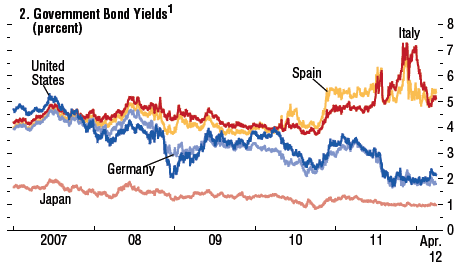 |
The above graph from the report illustrates what's happened as well as anything. What it shows is the interest rates that investors are demanding to loan money to various countries. What's happened quite dramatically since the credit crisis began in 2007 is that investors are demanding more and more interest on loans to Spain and Italy, and less and less interest on loans to Germany and the U.S. This reflects the prevailing view tha Spain and Italy are likely to need bailouts, and investors know that in the most recent bailout of Greece, investors were forced to take 74% "haircuts." On the other hand, everyone seems confident that Germany and the U.S. will pay off its bondholders in full, an assumption that Generational Dynamics predicts will turn out to be wrong.
World financial officials and pundits have been predicting every month that the housing crisis has bottomed out and that the economy is starting to grow again. What we're seeing in real time is what I learned about when I was in school in the 1950s, when my teachers ridiculed the officials and pundits of the 1930s who kept predicting that "prosperity was just around the corner." Last week, I quoted Wharton School's Jeremy Siegel as predicting a stock market rise to Dow 17,000 within a couple of years, which puts him into the tin foil hat category. (See "14-Apr-12 World View -- Wharton School's Jeremy Siegel is lying about stock valuations")
This is how generational theory works. The generations of survivors of the 1929 crash and the 1930s Great Depression are gone now, and nothing like it has happened since then, leading the politicians and pundits to conclude that it can never happen again because economists have figured out how to prevent it, by going more and more massively into debt. As Alan Greenspan recently pointed out, every economy model has been dead wrong for the last few years. And as I've pointed out many times, economists cannot explain why there was a tech bubble at all, why it occurred in 1995 (as opposed to 1985 or 2005), why there was a real estate bubble, why there was a credit bubble, why the bubbles burst in 2007, or anything else that came after. They've been wrong time after time.
I'm always amused by the airhead financial experts and economists who say that the real estate bubble occurred because Alan Greenspan's Fed lowered interest rates in the 2002-2004 time frame. First off, the real estate bubble began in 1995, the same time as the tech bubble. And second, interest rates have been at zero for the last four years, and yet there's been no new real estate bubble; in fact, the last real estate bubble has continued to burst.
Turning now to Tuesday's IMF report, we can see the consequences of the continuing bursting of the real estate and credit bubbles:
"One must wonder why, with nominal interest rates expected to remain close to zero for some time, demand is not stronger in advanced economies. The reason is that they face, in varying combinations, two main brakes on growth: fiscal consolidation and bank deleveraging. Both reflect needed adjustments, but both decrease growth in the short term.Fiscal consolidation is in effect in most advanced economies. With an average decrease in the cyclically adjusted primary deficit slightly under 1 percentage point of GDP this year, and a multiplier of 1, fiscal consolidation will be subtracting roughly 1 percentage point from advanced economy growth this year.
Bank deleveraging is affecting primarily Europe. While such deleveraging does not necessarily imply lower credit to the private sector, the evidence suggests that it is contributing to a tighter credit supply. Our best estimates are that it may subtract another 1 percentage point from euro area growth this year."
What's being described here is the collapse of the credit bubble. While the credit bubble was being created, roughly from 1995 to 2007, governments, businesses and individuals went into tens of trillions of dollars of debt. That debt was used to purchase homes and stocks, creating bubbles in those sectors. Once the bubble started bursting, governments, businesses and individuals began paying down debt. So that means tens of trillions of dollars are leaving the world economy. It took 12 years (1995-2007) to build up the credit bubble, so it's reasonable to expect it to take 12 years to collapse it (2007-2019).
The IMF report depicts a kind of uneasy calm in the world, as a lot of people are claiming/hoping/wishing that the crisis has ended, but the report makes it clear how dangerous things are.
"Accordingly, downside risks continue to loom large, a recurrent feature in recent issues of the World Economic Outlook. Unfortunately, some risks identified previously have come to pass, and the projections here are only modestly more favorable than those identified in a previous downside scenario.The most immediate concern is still that further escalation of the euro area crisis will trigger a much more generalized flight from risk. This scenario, discussed in depth in this issue, suggests that global and euro area output could decline, respectively, by 2 percent and 3½ percent over a two-year horizon relative to WEO projections. Alternatively, geopolitical uncertainty could trigger a sharp increase in oil prices: an increase in these prices by about 50 percent would lower global output by 1¼ percent. The effects on output could be much larger if the tensions were accompanied by significant financial volatility and losses in confidence."
The above paragraphs describe a very interesting concept: "a much more generalized flight from risk." This phrase captures the issue that generational theory focuses on. The fear being stated is that people will be less and less likely to want to borrow money or to lend money. Since debt was the main engine that kept the economy growing before 2007, a "flight from risk" means that the economy will not grow again. This is exactly the generational point. The Boomers and Gen-Xers who were so abusive of credit and debt prior to 2007 have now been very badly burned, and they're going be exhibiting a "flight from risk" for most of the rest of their lives. They will never be willing to go into debt again to the extent that they did prior to 2007. That's why there won't be any real growth again until the 2020s, when today's generation of young children become demanding teenagers.
As I've said, there's no solution to this problem. There's no way to reflate the credit and housing bubbles, though the Fed and the European Central Bank (ECB) are certainly trying. The new IMF report recommends more of that:
"Furthermore, excessively tight macroeconomic policies could push another of the major economies into sustained deflation or a prolonged period of very weak activity. Additionally, latent risks include disruption in global bond and currency markets as a result of high budget deficits and debt in Japan and the United States and rapidly slowing activity in some emerging economies. However, growth could also be better than projected if policies improve further, financial conditions continue to ease, and geopolitical tensions recede.Policies must be strengthened to solidify the weak recovery and contain the many downside risks. In the short term, this will require more efforts to address the euro area crisis, a temperate approach to fiscal restraint in response to weaker activity, a continuation of very accommodative monetary policies, and ample liquidity to the financial sector."
This is where the schizophrenia sets in. The IMF itself has been a world leader in demanding austerity from countries that it bails out. But here, the IMF report is recommending that austerity be abandoned, replaced with an unending, infinite supply of liquidity.
The report says this even more strongly later:
"Austerity alone cannot treat the economic malaise in the major advanced economies. Policies must also ease the adjustments and better target the fundamental problems––weak households in the United States and weak sovereigns in the euro area––by drawing on resources from stronger peers.Policymakers must guard against overplaying the risks related to unconventional monetary support and thereby limiting central banks’ room for policy maneuvering. While unconventional policies cannot substitute for fundamental reform, they can limit the risk of another major economy falling into a debt-deflation trap, which could seriously hurt prospects for better policies and higher global growth."
The phrase "unconventional monetary support" of course means print an infinite amount of money and pour it into the banking system, trying to stave off a deflationary spiral. That's what's been tried in ever-increasing doses since 2007, and it's failed to work, because generational attitudes and behaviors have changed.
Europe is now right on the verge of a major new crisis. There will be enormous pressure on the ECB to flood the banks with free liquidity, but there will also be enormous pressure from the Germans not to let that happen. Meanwhile, the U.S. government goes exponentially deeper and deeper into debt, waiting for some crisis to cause everything to unravel. Generational Dynamics predicts that crisis is coming with 100% certainty.
(Comments: For reader comments, questions and discussion,
see the 18-Apr-12 News -- IMF's World Economic Outlook warns of eurozone meltdown
thread of the Generational Dynamics forum. Comments may be
posted anonymously.)
(18-Apr-2012)
Permanent Link
Receive daily World View columns by e-mail
Donate to Generational Dynamics via PayPal
Ban Ki-moon asks the EU for airplanes and helicopters for observers
This morning's key headlines from GenerationalDynamics.com.
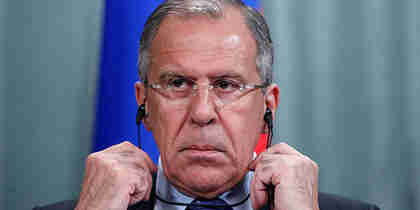 |
As it becomes increasingly clear that Syria's president Bashar al-Assad agreed to go along with Kofi Annan's "peace plan" simply to buy time to slaughter more innocent Arab citizens, al-Assad's main backer, the Russians, are suffering another round of major humiliations, along with Kofi Annan himself. Russia has been al-Assad's loyal backer, and has supplied huge amounts of weapons, while at the same time saying that Annan's peace plan should end the violence. Since that obviously isn't happening, Russia's foreign minister Sergey Lavrov is blaming the "Friends of the Syrian people" group of Western and Arab nations, which he said was undermining UN peace efforts. (The "Friends of the Syrian People" are 60 countries currently meeting in Paris to reinforce sanctions imposed on the Syrian regime.)
Apparently Lavrov believes that the U.S., Europe and Arab countries should just smile sweetly at al-Assad and say, "Oh you just go ahead and kill as many innocent Arabs as you want, as if they were cockroaches." Here's what Lavrov said:
"There are countries, there are external forces, that are ... encouraging the Syrian opposition not to cooperate with the government in providing for a ceasefire and the subsequent establishment of dialogue."
So, the Syria crisis still has a way to go before it unravels. Reuters
In the end, it's going to be Turkey that decides what happens in Syria. If Turkey wants to take some action, then the West and the Arab League will go along with it, while Russia fumes. And as I wrote last week, Turkey believes that, even without the United Nations Security Council, Turkey believes that it has the necessary legal backing to take military action on Syrian soil, thanks to the "Adana Agreement" signed with Syria in 1998.
Turkey's Prime Minister Recep Tayyip Erdogan on Tuesday accused the Syrian regime of continuing to attack civilians, despite agreeing to Kofi Annan's peace plan. He said:
"Delaying [solutions to] the problem in Syria will only give the regime more time for new acts of brutality. The Syrian regime is using stalling tactics. Even though we have no hope for the cease-fire, we will wait, continue to closely follow the developments and bring Syria to the attention of the international community."
I'm interpreting his phrase "we will wait" to mean that Turkey will not intervene in Syria. Zaman (Istanbul)
The United Nations Security Council is expected to authorize a full mission of 250 observers to Syria on Wednesday. But U.N. Secretary-General Ban Ki-moon would like to send even more observers, and has asked European Union leaders to provide helicopters and airplanes for their mobility within Syria. Six observers have already arrived, and 25 more have already been authorized. The observers are facing the same Catch-22 that the original Arab League monitors did in January. The monitors are unarmed, and the U.N. is demanding that Syria guarantee their safety. But that means that the Syrian regime will have to control the movements of the monitors, which means it can make sure that any violence that occurs will be unseen by the monitors. The Arab League monitor effort is considered by many people to be a total fiasco. LA Times
According to a report by Save the Children and the Overseas Development Institute, foreign aid is the biggest factor in reducing child mortality. Four million fewer children aged under five died in 2010 than in 1990. Over 50 million more children were enrolled in school in the last decade. 131 countries now have over 90 per cent immunisation coverage for diphtheria, tetanus and major preventable childhood diseases such as measles, compared to just 63 in 1990. Foreign aid is responsible for these changes, according to the report. As usual, it falls to me as the gloomiest person in the world to point out that a reduction in child mortality means faster population growth, less food and other resources per capita, and more cannon fodder for the next war. Telegraph
(Comments: For reader comments, questions and discussion,
see the 18-Apr-12 News -- IMF's World Economic Outlook warns of eurozone meltdown
thread of the Generational Dynamics forum. Comments may be
posted anonymously.)
(18-Apr-2012)
Permanent Link
Receive daily World View columns by e-mail
Donate to Generational Dynamics via PayPal
Plans go forward for Israel's attack on Iran's nuclear facilities
This morning's key headlines from GenerationalDynamics.com.
 |
The story of Greece is being repeated with Spain, as bond yields (interest rates) continue to increase, indicating that investors are betting that Spain is going to have to be bailed out. And since investors in Greek bonds had to take a 74% "haircut" (losing 74% of their investments) when Greece was bailed out, investors in Spanish bonds should expect no less. The European Central Bank (ECB) has "printed" €1.1 trillion since December and poured it into European banks in its LTRO program, particularly Spanish banks, allowing them to use the money to purchase Spanish bonds, in order to drive down interest rates. But the LTRO money has run out, and now politicians are beginning to demand that the ECB pour another flood of money into the banks. Once again, this will only work until the money runs out. Nonetheless, ECB chairman Mario Draghi will make an announcement on Tuesday, and it may be a new liquidity flood of some kind. Reuters
Switzerland's six-month Treasury bills have been in such high demand that the purchase price of one of the bonds is larger than the nominal value of the bond, meaning that they're being purchased for negative interest rates (yields), in this case -0.251%. Why would anyone purchase a bond where they know they're going to lose money? Mainly because Swiss bonds are considered safe (as opposed to other countries' bonds). Switzerland is not in the eurozone, and has its own currency, the Swiss franc. Switzerland is a financial center and is a big exporter of precision products, meaning that it won't have to borrow money. If an investor has a lot of cash and wants to put it somewhere safe, then Swiss bonds are a reasonable choice. Bloomberg
A major Israel TV station on Sunday night broadcast a detailed report on how Israel could go about attacking Iran’s nuclear facilities, possibly this summer. Dozens or hundreds of planes will take part in the mission: attack and escort jets, tankers for mid-air refueling, electronic warfare planes and rescue helicopters, with concerns about advanced SA-17 and SA-22 anti-aircraft systems that Russia has sold to Iran. The attack, the report said, would presumably trigger a war in northern Israel, with missile attacks (presumably from the Iranian-proxy Hezbollah in Lebanon). "There will be no tranquility and peace anywhere in Israel," said the reporter. Times of Israel
Palestinian Authority Prime Minister Salam Fayyad, representing President Mahmoud Abbas, will meet with Israel's Prime Minister Benjamin Netanyahu in Jerusalem on Tuesday afternoon, and will prsent a letter stating demands that have to be met for negotiations to resume. The message will charge Netanyahu with draining the Palestinian Authority of all authority it gained in the agreements Israel and the PLO signed over the years. The message will stress that the current situation is unbearable and will demand that Netanyahu freeze all settlement construction and express publicly his willingness to negotiate on the basis of the 1967 borders. According to reports, Fayyad is delivering this letter to Netanyahu very reluctantly, since he considers the action to be a worthless publicity stunt. Haaretz
Argentina's president Cristina Fernández de Kirchner announced plans on Monday to seize control of leading energy company YPF, taking control away from Spain's Repsol. Kirchner has previously nationalized private pension funds and the country's flagship airline, Aerolineas Argentinas. Kirchner is angry at YPF because Argentina was forced to begin importing oil in 2010. Reuters
(Comments: For reader comments, questions and discussion,
see the 17-Apr-12 World View -- Europe fiscal crisis worsens as Spain's bond yields push through 6%
thread of the Generational Dynamics forum. Comments may be
posted anonymously.)
(17-Apr-2012)
Permanent Link
Receive daily World View columns by e-mail
Donate to Generational Dynamics via PayPal
U.N. observers arrive in Syria as 'cease-fire' shows signs of collapse
This morning's key headlines from GenerationalDynamics.com.
 |
Following ethnic traditions, South Africa's 70-year-old Zulu leader Jacob Zuma next weekend will marry Gloria Bongekile ("Bongi") Ngema. Bongi will be his fourth wife and his sixth marriage -- one wife divorced him, and another one committed suicide. Zuma's other wives are Sizakele Khumalo, whom he met in 1959, Nompumelelo "MaNtuli" Zuma and Thobeka Stacey Mabhija. He is thought to have around 20 children, including one three-year-old son by his new wife-to-be. The president acknowledged his wives: "I have them; they are many. They know that who comes in does not close the door behind [her] because it was not shut behind her." Times Live (South Africa)
A series of explosions and sniper attacks began in Kabul on Sunday, and continued into Monday morning. The attacks occurred in a supposedly super-secure part of Kabul, the capital of Afghanistan, calling into question the stability of Afghanistan's government as U.S. and Nato forces prepare to leave. According to a Taliban spokesman, "These attacks are the beginning of the spring offensive and we had planned them for months." However, U.S. officials are praising the Afghan security forces that were able to repel the attacks without U.S. or Nato help. CNN and Reuters
The first members of a U.N. monitoring team have arrived in Syria, a four days after a so-called cease-fire that is showing serious signs of collapse. The six monitors arrived Sunday in Damascus, to begin their work Monday morning. The observers arrived amid reports that government helicopter gunships were pounding the city of Homs, targeting residential neighborhoods. As in the case of January's failed Arab League observer group, the Syrian government is demanding that all movement by the observer group be coordinated with the government. "Syria cannot be responsible for their security unless it participates and coordinates all the steps on the ground," said a Syrian government spokesman. CNN
 |
North Korea new leader Kim Jong-un has made his first televised public speech, as Pyongyang marks the 100th anniversary of the birth of the country's founder, Kim Il-sung. This was the first time Kim Jong-un, believed to be in his late 20s, has spoken publicly since taking power following the death of his father in December. He gave his speech as a huge military parade passed by, including a large new missile camouflaged and carried on a 16-wheel truck. He said that national pride was more important than peace. "Let us move forward to final victory," he said. He praised the country's "military first" policy. "Superiority in military technology is no longer monopolised by imperialists. We have to make every effort to reinforce the people's armed forces." After last week's attempt to launch a long-range missile turned into a major humiliating fiasco, North Korea is thought to be particularly dangerous right now, as Kim Jong-un is expected to launch some provocative military act to recover the country's "national pride." BBC
Argentina's president Cristina Kirchner and Bolivia's president Evo Morales stormed out of the annual Summit of the Americas conference, attended by Barack Obama and by the leaders of 30 Western Hemisphere nations under the auspices of the Organization of American States (OAS). Kirchner was the first to storm out because the conference did not support Argentina's claim to the Falkland Islands (called the Malvinas by Argentina). The Falklands have historically been a colony of the U.K., and were retained by the U.K. by defeating an Argentine attack in the early 1980s. Morales followed Kirchner out of the meeting because the United States and Canada vetoed the participation of Cuba at next year's meeting. Al-Jazeera
(Comments: For reader comments, questions and discussion,
see the 16-Apr-12 World View -- Taliban in Afghanistan begin their 'spring offensive'
thread of the Generational Dynamics forum. Comments may be
posted anonymously.)
(16-Apr-2012)
Permanent Link
Receive daily World View columns by e-mail
Donate to Generational Dynamics via PayPal
China demands complete sovereignty over Philippine island
This morning's key headlines from GenerationalDynamics.com.
 |
Thousands of Orthodox Christians filled Jerusalem's ancient Church of the Holy Sepulchre and surrounding streets on Saturday for the Easter "Holy Fire" ceremony. At midnight, the priest produces a fire from the altar, lighting a candle with it. Each person is holding a candle, and the fire is passed from person to person. In Athens, the ceremony lights up the whole city. The ceremony dates back to the 4th century, and symbolizes the resurrection of Jesus Christ. AFP
Over 2,000 Coptic Christians from Egypt visited the Holy Land for Easter, defying a ban imposed on visiting Jerusalem and Israeli-controlled areas. The ban has been in effect for three decades, imposed by the Coptic leader Pope Shenouda III to protest Egypt's 1979 peace agreement with Israel. However, Shenouda died last month, and although the ban remains in effect, Egyptian Christians decided that this was their chance. AP
 |
Although the Chinese fishing boats have been permitted to leave the lagoon where they had been held by a Philippine warship, the confrontation with Chinese military vessels has raised nationalistic anger on both sides. (See "12-Apr-12 World View -- Philippines and China in nationalistic confrontation in South China Sea.") The fishing vessels were detained near the Scarborough Shoal (called Huangyan Island by the Chinese), off the coast of Manila. The island has historically been part of the Philippines, but China is demanding sovereignty over it and all the islands in a huge region in the South China Sea. On Friday, China's Foreign Ministry said:
"Huangyan Island is an integral part of Chinese territory. Actions from the Philippine side have infringed upon China's sovereignty and violated the consensus of maintaining the peace and stability of the South China Sea, not complicating and aggravating the situation. China has sent law enforcement ships to ensure the safety of Chinese fishermen and vessels."
China's demand for complete sovereignty over an island that historically has been part of the Philippines is a portent of things to come. Chinese Foreign Ministry
Now that the so-called Syria "truce" is in place, and only a paltry 20 people were killed on Saturday, the United Nations Security Council passed a resolution approving a team of up to 30 unarmed observers to be deployed in Syria. Six observers will arrive on Sunday. In January, a previous team of observers was sent by the Arab League, and they were made fools of by the Bashar al-Assad regime, which restricted their movements to regions where there was no violence. It remains to be seen whether the new observer group will be more effective. BBC
 |
This weekend the Organization of American States will be holding its annual "Summit of the Americas" conference, but Venezuela's president Hugo Chávez will not be there to call America "the devil" in front of dozens of other leaders. Instead, he'll be headed for a long stay in Cuba, perhaps as long as 90 days, to receive further cancer treatments. He's never released information on the type and severity of his cancer, so Venezuelans do not know "how long the president has to live." Reuters
(Comments: For reader comments, questions and discussion,
see the 15-Apr-12 World View -- For Easter, Jerusalem lights up with the 'Holy Fire' celebration
thread of the Generational Dynamics forum. Comments may be
posted anonymously.)
(15-Apr-2012)
Permanent Link
Receive daily World View columns by e-mail
Donate to Generational Dynamics via PayPal
Spectacular missile failure makes North Korea very dangerous right now
This morning's key headlines from GenerationalDynamics.com.
 |
One thing I like to do every now and then is to highlight a politician or journalist or analyst or professor going on TV and blatantly lying.
On Friday, it was "well respected" professor Jeremy Siegel of the Wharton School, lying about stock valuations (price/earnings ratios). Here's what he said on Bloomberg TV (my transcription). He's making a predictions that stocks will surge to Dow 15,000 or even Dow 17,000 within the next two years, and he was asked why:
"Oh, valuations. very persuasive valuations right now. P/E ratios are below the long run average. That's quite remarkable in this environment. ...[P/E ratios are about] 13, which means that [stocks] are earning 7-8% right now, even without an earnings increase. You need strong earnings increases when the market is selling at 20 p/e ratios, or 25 -- those growth stocks need them. At these valuations, modest increases are more than enough to beat any fixed income asset that's out that there."
Well, "well-respected" professor Jeremy Siegel was simply lying. On Friday, according to the Wall Street Journal, the P/E ratio index is at 16.26. A year ago it was 17.81. Both figures are far higher than the "long-run average," which happens to be 13.91.
 |
So Jeremy Siegel was lying. Why would he lie? Because everybody lies these days, ever since the Gen-Xers started running everything a few years ago. There's no downside to lying because nobody calls anyone out for lying, or for being a crook. (I call people out all the time for lying, but no one gives a shit about that.)
Since Siegel is a "well-respected" professor, I assume that he's a consultant for some hedge fund or investment house who pay him to lie on CNBC and Bloomberg TV, so he trades on his "well-respected" reputation to make himself and his clients a lot of money.
People lie constantly on CNBC and Bloomberg TV in order to justify their 7-digit income. One reason I like to focus on price/earning ratios is because it's so easy to prove that they're lying. I quote what they say, and then I quote the Wall Street Journal from the same day. Other people whom I've spotlighted in the past include Ron Baron, chairman and CEO of Baron Capital, Abby Joseph Cohen, head of Global Markets Institute Management at Goldman Sachs, Hank Smith, the Chief Investment Officer of Equity for Haverford Quality Investing, and Charles Bobrinskoy, Vice Chairman, Director of Research, Ariel Investments.
Are all of these people crooks? It depends on what you mean by "crook." It's true that they openly lie to defraud investors, but that's the norm today. Can someone be a crook if being a crook is the norm? I don't know the answer to that question.
The North Koreans had invested a great deal of prestige in their long-range missile test. They invited dozens of international reporters to witness the event, timing it to coincide with the huge celebrations for the 100th anniversary of the birth of North Korea's founder, Kim Il-sung. The North Koreans wanted to prove to the world that they were an important, sophisticated nation. So the failure of Thursday's launch with the whole world watching, with the missile disintegrating into debris falling into the sea within a minute or so of launch, has got to be a humiliation of historic proportions for North Korea. Many analysts consider North Korea to be particularly dangerous right now, because the new leader, Kim Jong-un, may feel pressured to take some step that he think might restore the nation's prestige. There might be new nuclear tests, or there might be another military strike at South Korea, such as the two military strikes that occurred in 2010. The long-range missile test violated United Nations Security Council resolutions, and so one outcome of the failed test is that the Obama administration has canceled its offer to provide food aid to North Korea. LA Times
Syria's Bashar al-Assad regime appears to have passed a big test on Friday, when thousands of demonstrators poured out of mosques after midday prayers into the streets to protest the Assad regime, and "only" a dozen or so of the protesters were killed by regime forces. This is considered to be "good news" for Syria, after the massive slaughters that occurred every day in past months. The United Nations Security Council is expected to vote on Saturday for unarmed U.N. observers to enter Syria, to watch for violence. BBC
The U.S. has begun sending promised nonlethal aid to the Syrian opposition, most of it medical and communications equipment. The supplies are going to nonviolent, political groups based on what they said would help them organize their efforts and provide aid to civilians, and the aid is likely to increase. Bloomberg
(Comments: For reader comments, questions and discussion,
see the 14-Apr-12 World View -- Wharton School's Jeremy Siegel is lying about stock valuations
thread of the Generational Dynamics forum. Comments may be
posted anonymously.)
(14-Apr-2012)
Permanent Link
Receive daily World View columns by e-mail
Donate to Generational Dynamics via PayPal
Syria regime slaughter down on truce, as Friday protests loom
This morning's key headlines from GenerationalDynamics.com.
 |
North Korea's test launch of a long-range missile was an immediate failure, as it crashed into the sea shortly after takeoff. The failure is particularly humiliating, as the launch coincides with the 100th birthday celebrations of the founder of North Korea, Kim Il-sung, whose grandson, Kim Jong-un, now rules. As the launch was a clear violation of U.N. Security Council resolutions, the Security Council will hold an emergency session on Friday, "to decide the next step" following the launch. Hankyoreh (Seoul)
We recently posted a story about how Hong Kong residents go around singing songs that describe mainland Chinese tourists as uncouth "locusts." Tensions are growing in Hong Kong over Beijing attempts to assert greater control over Hong Kong. Hong Kongers fear loss of academic freedom in colleges and loss of freedom of the press. A primary cause of the recent anger among Hong Kong residents is the use of Hong Kong’s resources by mainlanders. Birth tourism is one of the most visible examples of this. Large numbers of mainland women travel to Hong Kong to give birth so they can receive better medical care and obtain a Hong Kong identification for their child, entitling the child to Hong Kong’s resources, including public education. Last year, approximately 40,000 mainland women gave birth in Hong Kong, which caused hospital beds to be in short supply.
From the point of view of Generational Dynamics, the significance of this growing split between Hong Kong and Beijing is that it's expected to grow. I've been writing for several years that China is overdue for a new national civil war. (See "China approaches Civil War" from 2005.) China's history is full of massive civil war rebellions, such as the White Lotus Rebellion (1796-1805) and the Taiping Rebellion (1852-1869), killing millions or tens of millions of people. These occur at regular intervals, with each new one occurring at about the time that the survivors of the preceding one die off. The last of these rebellions was Mao's Communist Revolution (1934-49) civil war, and now it's time for the next one. During Mao's Communist Revolution, anyone who could find a way to reach Hong Kong could escape to Formosa (Taiwan) or to the West. So it appears that Hong Kong may once again play a central role in a Chinese crisis civil war. Jamestown
Syria's regime on Thursday claimed to have "proved" that everything it says is credible, claiming that there is a "truce" and the violence has stopped, and indeed the regime killed only 20 or so people on Thursday, down from the usual 100 per day. However, all the tanks, soldiers and snipers are still in the streets, ready to reengage at any time. The test will come on Friday, when people will pour out of mosques into the streets after midday prayers and begin demonstrations and protests. The regime claims that peaceful protests are permitted, but adds that all such protests must be registered and approved in advance, something that isn't going to happen. So the world will be watching to see what happens on Friday. Bloomberg
A proposed U.S.-drafted United Nations Security Council resolution whould authorize deployment of up to 30 unarmed inspects to monitor Syrian compliance with ceasefire. The draft also would have the council condemn "widespread, systematic, and gross violations of human rights ... by the Syrian authorities (and urge that) those responsible for human rights violations shall be held accountable." Russia and China have vetoed similar resolutions in the past. Reuters
(Comments: For reader comments, questions and discussion,
see the 13-Apr-12 World View -- North Korean rocket launch a humiliating failure
thread of the Generational Dynamics forum. Comments may be
posted anonymously.)
(13-Apr-2012)
Permanent Link
Receive daily World View columns by e-mail
Donate to Generational Dynamics via PayPal
European financial crisis growing quickly in Spain and Italy
This morning's key headlines from GenerationalDynamics.com.
 |
According to the Philippines side of the story, a Philippine warship was patrolling the Panatag (Scarborough) Shoal and came across eight Chinese fishing vessels anchored inside a lagoon. A Philippine inspection team boarded the finshing vessels and found large amounts of illegally collected corals, giant clams and live sharks inside the compartments of the first inspected vessel. Then two Chinese maritime surveillance ships entered the lagoon and prevented the fishermen from being arrested.
According to the Chinese side, the fishing boats took shelter from the weather in the lagoon of Huangyan Island, when a Philippine warship showed up, boarded the fishing vessels, and harassed the Chinese fishermen. Two Chinese maritime surveillance vessels showed up and demanded that the Philippine gunboat leave, because Huangyan Island is an integral part of Chinese territory and China has indisputable sovereignty over the island.
The island in question is fairly close to Manila, but China has become increasingly aggressive in claiming all the islands in the South China Sea as their sovereign territory, even islands that have historically been part of other countries' sovereign territory. The claim that China has "indisputable sovereignty" is a joke. China is in territorial disputes with Philippines, Vietnam, Malaysia, Taiwan and Brunei, and it's clear that an increasingly nationalistic China has no intention of backing down, and will pursue its claims with its rapidly growing and increasingly hostile and belligerent military force. Philippine Daily Inquirer and Shanghai Daily
The news on Wednesday morning was the Syria's president Bashar al-Assad had agreed to Kofi Annan's peace plan, and would end the violence by Thursday morning. Hooray!! But by Wednesday afternoon, it turned out that Syria reserves the right to respond to any attack by "armed terrorist groups," which is exactly what the Syrian regime has been saying for over a year. So nothing's changed, and there was another day of game-playing and stalling by the Syrian regime, as they continued to slaughter innocent Arab citizens like cockroaches. Reuters
According to EuroIntel, we are right on the edge of a major new European financial crisis:
"It was only a couple of weeks ago, when [German Finance Minister] Wolfgang Schäuble and his subordinates briefed journalists in Brussels that the calming financial markets made a big firewall [bailout fund] unnecessary. And remember all these statements, including from [Italian Prime Minster] Mario Monti, according to which the worst of the financial crisis was behind us? Complacency is the default mode of eurozone policy makers.Yesterday, the financial markets produced a reminder that the crisis continues. Italian and Spanish 10-year spreads are now back in the familiar territory of over 4% [above German bond yields]. Global stock markets fell over fears of a renewed eruption of the eurozone crisis, with Milan down 5%, driven by 8% falls in the share prices of Unicredit and Intesa San Poalo. Spanish ten-year yields [interest rates] now trade above 6% for the first time since December, and in Madrid there is clear no sense at all that the worst of the crisis is over. The 10-year [German] bund yield fell to an astonishing low of 1.649% [indicating that investors are selling Italian and Spanish bonds, and buying German bonds].
The news coverage, as ever, struggled to explain the turnaround in market sentiment -- oscillating between "markets worried about Spain missing its deficit targets" and "markets worried about Spain trying to hit its deficit targets". Our sense is that investors have belatedly realised that the austerity drive is counter-productive, and that Spain is virtually certain now to require an ESM [bailout] programme. El Pais lists the reasons for the shift in market sentiment: the visible deterioration in the Spanish deficit; the ECB's LTRO running out of steam; an insufficient attempt to force the Spanish banks to take losses; and doubts over the latest austerity budget.
The article noted that the announcement of further €10bn in cuts failed to calm the markets. The bond spreads are now only a whisker from its absolute peak in November when they reached 4.7%. The articles quotes a financial analyst as saying that once Spain applies for the ESM [bailout], the mechanism will then be regarded as quite small. Spanish officials were wheeled out yesterday to downplay the crisis, with economy minister Luis de Guindos saying that Spain had already raised half of its 2012 refinancing requirements, and central bank chief Miguel Ordonez insisted that Spain was "not even close" to an ESM programme. Earlier in the day Reuters reported -- without even a hint of irony -- that the European Commission welcomed new Spanish austerity plans, and that it had a positive view on the 2012 budget draft."
(Comments: For reader comments, questions and discussion,
see the 12-Apr-12 World View -- Philippines and China in nationalistic confrontation in South China Sea
thread of the Generational Dynamics forum. Comments may be
posted anonymously.)
(12-Apr-2012)
Permanent Link
Receive daily World View columns by e-mail
Donate to Generational Dynamics via PayPal
Spain moving rapidly to become 'the next Greece'
This morning's key headlines from GenerationalDynamics.com.
 |
The bloody massacre of innocent civilians in Bahrain that began in February of last year is comparable to the the bloody massacre of civilians in Syria. Bahrain had been scheduled to host the Formula One Grand Prix automobile race in October, but the event was postponed because of the violence. Now it's scheduled for next week, beginning April 22, and there are calls for it to be canceled or postponed again. Some teams are questioning the ethics and morality of holding the event in Bahrain, while protesters in Bahrain are threatening protests and possible violence directed at Formula One officials. Telegraph
Former U.N. secretary-general Kofi Annan pretended to be shocked on Tuesday that his peace plan, which called for a cessation of violence on Tuesday, had failed. In fact, Syrian troops actually launched fresh attacks on rebellious areas, but Annan said there was still time to salvage a truce. Since Annan is not stupid, he must be lying. Turkey's Prime Minister Recep Tayyip Erdogan is on a long diplomatic trip, including stops in Russia, China, Iran and Saudi Arabia, to gain support for a new U.N. Security Council resolution. The new resolution will say something like "we condemn Bashar al-Assad for the violence," but even that will probably be vetoed by Russia and China. Either way, nothing's going to happen until Turkey loses its patience and takes some military action. Zaman (Istanbul)
You'll recall, Dear Reader, that European officials were going to solve the problem of keeping Greece out of bankruptcy by implementing a bond swap deal, where holders of Greek bonds would "voluntarily" swap them for brand new bonds, losing 74% of their original investment. However, you may also recall that there were private investor "holdouts," who refused to take part in the bond swap deal, hoping to avoid losing that 74%. And you may also recall that furious European officials were threatening these holdouts with disaster if they didn't give in. Well, more than a month has passed, and many private investors are still holding out. Greece has twice extended the deadline for these investors to agree to the bond swap. The deadline is now April 20. Reuters
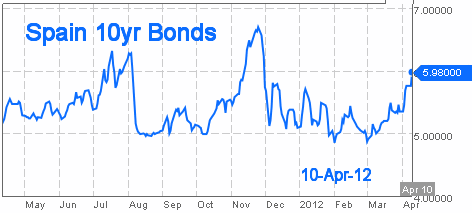 |
On Monday, Spain's Prime Minister Mariano Rajoy said:
"Without a doubt, a good part of Spain’s future is at stake. The problem is that the markets can lend or decide not to lend."
On Tuesday, investors demanded yields (interest rates) of 5.98%, just shy of the psychological 6% figure. If yields continue to rise, as they did for Greece, Portugal and Ireland, then Spain will need a bailout, just like those countries. I keep hearing financial pundits say ridiculous things like:
This is a generational crisis era, and all the debts that have built up since the end of World War II are now coming due, and there's no way to pay them. Bloomberg
(Comments: For reader comments, questions and discussion,
see the 11-Apr-12 World View -- Formula-One Grand Prix officials threatened in Bahrain
thread of the Generational Dynamics forum. Comments may be
posted anonymously.)
(11-Apr-2012)
Permanent Link
Receive daily World View columns by e-mail
Donate to Generational Dynamics via PayPal
Philippines to commemorate 70th anniversary of the Bataan Death March
This morning's key headlines from GenerationalDynamics.com.
 |
The Philippines on Tuesday will commemorate the 70th anniversary of the Bataan Death March. More than 76,000 Filipino and American soldiers surrendered to the Japanese Imperial Army, following the fall of Bataan on On April 9, 1942. They were forced to march the 128-kilometer stretch from Bataan to Capas, Tarlac, but thousands of them died or were killed along the way either due to extreme fatigue due to lack of food and water and lack of sleep. Many of the prisoners of war (POW) who could no longer walk were shot to death or bayoneted by their Japanese captors. An estimated 10,000 Filipino and American POWs died before they could reach Capas. The Bataan Death March followed the attack on Pearl Harbor by only a few months, and for the first time, Americans became aware that the war with Japan would not end easily, but would go on for years. Zambo Times (Manila) and U.S. Air Force
Satellite images show that North Korea is digging a new tunnel underground in the country's nuclear test site, where it conducted previous nuclear tests, first in 2006 and then in 2009. According to a South Korean intelligence official, "North Korea is making clandestine preparations for a third nuclear test at Punggye-ri in North Hamkyong Province, where it conducted two nuclear tests in the past." This comes at a time when North Korea is just about to launch a long-range missile test. It was just a few weeks ago that the North Koreans promised to end nuclear development, including development of long-range missiles. Korea Herald
Japan has deployed Patriot missile batteries in Tokyo and dispatched destroyers, as North Korea makes final preparations for a long-range test rocket launch that has received world wide condemnation. In addition, Philippine Airlines, Japan Airlines and All Nippon Airways are changing flight paths, while Philippine officials have declared a no-fly zone and urged ships and fishing boats to avoid northeastern territorial waters where rocket debris may fall. AFP and AP
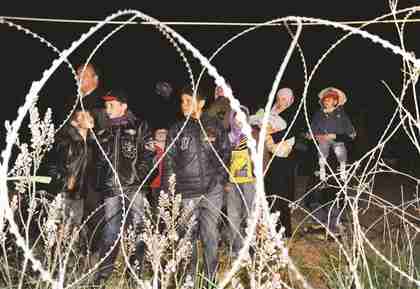 |
Turkey on Monday said that the Kofi Annan peace plan has become irrelevant, on a day when two Turks – a policeman and a translator – and four Syrians were injured at a refugee camp in the border province of Kilis from bullets fired from Syria. Other reports indicate that two Syrians were killed as well. Turkey's Foreign Ministry said that all Syrians who take shelter in Turkey were under the country’s "full protection," and warned that "the necessary measures will be implemented if such incidents are repeated." Hurriyet (Istanbul) and AP
Whereas Syria's attack across Turkey's border may have been a first, Syria has frequently fired into Lebanon's border, and Syrian troops have crossed the border into Lebanon in pursuit of refugees, leading to the killing and wounding of several Lebanese citizens in recent months. On Monday, three Lebanese journalists came under fire by a two-hour barrage of bullets from Syria's army, killing Ali Shaaban, a cameraman. "Ali Shaaban became a martyr after the Syrian army opened fire on Al-Jadeed’s car," said a colleague. Lebanon is split politically, because Syrian government ally Hizbollah is part of the Lebanese government. Daily Star (Beirut)
During the last year, Turkey has talked about some military options -- establishing a "buffer zone" or "humanitarian corridor" on Syrian soil, where Syrian refugees could go and be protected by Turkey's army -- but has repeatedly said that no action could be taken without the approval of the United Nations Security Council. In lieu of such action, Turkey has built several refugee camps on Turkish soil, with a capacity of about 45,000 refugees, still well above the 24,000 refugees currently housed.
But Monday's actions by Syria's army, firing across the border into Turkey and Lebanon, has caused Turkey to reevaluate its options. Even without U.N. approval, Turkey can still legally intervene militarily into Syria because of the "Adana Agreement," signed by Turkey and Syria in Adana, Turkey, on October 20, 1998. According to the Adana Agreement:
Turkey may even ask NATO to invoke Article 5 of the NATO Charter, which says that an attack on any member shall be considered an attack on all. The article was invoked by the US for the first time in October 2001, after the 9/11 attacks on the U.S. Zaman (Istanbul) and Zaman
(Comments: For reader comments, questions and discussion,
see the 10-Apr-12 World View -- Syria's army attacks across borders into Turkey and Lebanon
thread of the Generational Dynamics forum. Comments may be
posted anonymously.)
(10-Apr-2012)
Permanent Link
Receive daily World View columns by e-mail
Donate to Generational Dynamics via PayPal
N. Korea gives bizarre press conference to show off its long-range missile
This morning's key headlines from GenerationalDynamics.com.
 |
Syria had announced that it had "accepted" Kofi Annan's peace plan, and Syria's ambassador to the U.N. had said so quite clearly. But on Sunday, Syria's foreign ministry said that its position had been "misinterpreted." Syria isn't going to agree to any peace plan until:
Needless to say, none these things will happen while the regime of Bashar al-Assad is conducting mass slaughter of innocent Arab civilians, exterminating them as if they were cockroaches. In fact, this whole peace plan has actually been counterproductive, as it's given al-Assad the impetus to conduct even bloodier slaughters.
I've referred to this whole Kofi Annan "peace process" as farcical several times. What still amazes me is how Kofi Annan and these other politicians make total fools out of themselves by pretending that this farcical plan ever even made sense. The sheer stupidity of politicians is not to be believed -- except that we see it every day.
Al-Assad has also made a fool of the Russians, who have been counting on the Kofi Annan peace farce to help them save face, as they've become the major defender of the slaughterer-in-chief. It will be interesting to see how Russia weasels out of this situation.
I haven't said this in several years, but it's worth repeating now: It's like were all in a movie theatre watching a bad movie, and we'd like to leave, but all the doors are locked, and we can't get out of the movie theatre.
This is the way the world works. The United States has intervened in many places since they became Policemen of the World following World War II. You can argue that some of those interventions should not have taken place, but they were always for benevolent reasons, to protect the world from a new world war.
The politically correct thing to say is that "the United Nations should be the one to intervene as policemen of the world." Have they ever done that? It takes a nation like the U.S. to be willing to act unilaterally, or with a "coalition of the willing," to intervene effectively. The United Nations is completely worthless and useless. Independent and Arab News
After several terrorist attacks on Israel launched from the Sinai Peninsula in recent months, the Egyptian government announced on Saturday that, in cooperation with Israel, it has started deploying troops in the northern Sinai Peninsula. According to Egyptians sources, a total of 2500-3000 soldiers will be introduced gradually. Israel's agreement was required for this deployment because the Israel-Egypt peace treaty signed in the 1970s forbids deployment of Egyptian army forces in the Sinai. Egyptian sources also say the campaign was launched because the situation in Sinai is likely to pose a serious threat to the security situation inside Egypt itself. In recent weeks, there have been numerous reports of attacks by armed Bedouin and other militias active within Sinai, even against Egyptian soldiers. Haaretz
Venezuela's President Hugo Chávez has only been home for three day, but on Sunday he returned again to Cuba for another cancer treatment. According to Chávez:
"I have to continue this battle for life. ... Through faith in the Risen Christ! We shall live and overcome!"
When Muammar Gaddafi was in power in Libya, he always knew how to keep tribal conflicts from growing out of control: He'd send out his helicopter gunships and slaughter the belligerents. But Gaddafi is gone, and most of Gaddafi's weapons stores have made their way into the hands of various militias and terrorist groups. In the Sabha region of southern Libya, the dark-skinned indigenous African Tibu (or Tubu) tribe is fighting with lighter-skinned Zuwaya Arabs. The fighting has eased since the Transitional National Council (TNC), Libya's interim government, sent 300 soldiers to quell the fighting, though there are claims that Tibu fighters are infiltrating the region from Niger, Chad and the Sudan. Reuters and Jamestown
A car bomb killed at least 16 people and wounded dozens more in the northern Nigerian town of Kaduna on Easter Sunday, after security officers stopped the vehicle carrying it from approaching a church. No group claimed responsibility for the attack, but it's thought that it was perpetrated by the terrorist group Boko Haram, which has attacked Christian churches in the past. Later in the day, there was a "minor explosion" in the central town of Jos, where no one was killed. Reuters
Mali's president Amadou Toumani Touré, who was driven from office in a coup two weeks ago, has officially resigned. Under an agreement with the coup leader, Amadou Haya Sanogo, Sanogo will resign, which will allow former Malian speaker of parliament Dioncounda Traore to serve as president with a transitional government until elections are held. With the apparent restoration of constitutional government, ECOWAS -- the Economic Community of West African States -- says that it will remove the harsh sanctions it had imposed, blocking all travel in and out of the landlocked Mali nation. However, the situation in northern Mali is still uncertain, with both Tuareg rebels and jihadist groups controlling different regions. VOA
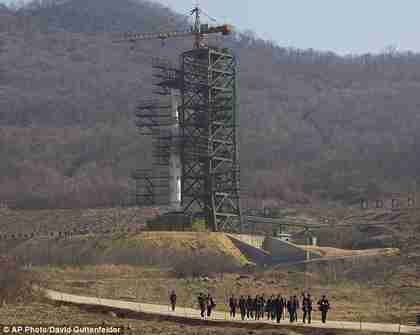 |
North Korea invited Western journalists to a bizarre press event at the top secret launch site for the long-range missile it plans to launch in mid-April. The purpose of the press event was to convince the West that the long-range missile is perfectly peaceful, and that they have no intention of loading it up with a nuclear weapon and targeting the U.S. west coast or other countries that it dislikes. The missile test violates an agreement that North Korea signed just a couple of months ago, agreeing to stop developing nuclear technology and related long-range missile technology. The U.S. has said it would cancel previously announced food aid if the launch is not canceled. BBC
According to the Organisation for Economic Co-operation and Development (OECD), aid flows from "rich" countries to "developing" countries fell in 2011, for the first time in 14 years, because of the financial crisis. However, even in good times, promises are made but not kept, as has been the case with the extravagant promises made at the G20 meeting in 2005. (Long time readers may recall that I used to mock these aid promises as political shows.) Guardian
(Comments: For reader comments, questions and discussion,
see the 9-Apr-12 World View -- Kofi Annan's farcical Syria 'peace plan' collapses
thread of the Generational Dynamics forum. Comments may be
posted anonymously.)
(9-Apr-2012)
Permanent Link
Receive daily World View columns by e-mail
Donate to Generational Dynamics via PayPal
Dissent begins to grow among al-Assad's Alawite supporters
This morning's key headlines from GenerationalDynamics.com.
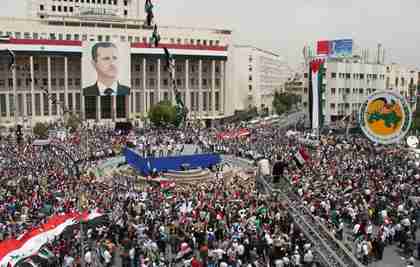 |
The U.S. has released satellite surveillance photos that show that claims by Syria's president Bashar al-Assad that he's pulled back forces were lies in many cases, as some troops and armored vehicles were kept in place or simply shifted around. America's ambassador to Syria, Robert Ford, posted a statement:
"This is not the reduction in offensive Syrian government security operations that all agree must be the first step for the Annan initiative to succeed. ...The regime and the Syrian people should know that we are watching. The regime cannot hide the truth."
Everyone's waiting to see what will happen on Tuesday, which is the day on which al-Assad has "promised" to cease all violence. It'll be interesting to see what spin he gives for not doing so. AP
The strongest supporters of Syria's president Bashar al-Assad are Alawites, followers of a variant of Shia Islam. Al-Assad's army is populated by Alawites, and the Alawites receive governmental favors, discriminating against the larger Sunni Muslim population. But there are reports that even among the Alawite community dissent is growing. According to one Alawite activist, "People are saying, 'how long will we have to bear this', more and more army families are wondering what they are sacrificing their children for, they are starting to say 'where are the martyrs from the Assad family?'" One elderly Alawite widow, at her son's funeral, said, "You Assads have taken my whole family, and all for nothing."
It's hard to know whether these reports represent a real trend, or if they're wishful thinking. But from the point of view of generational theory, this change is not surprising. Syria is in a generational awakening era, and as in America's last generation awakening era in the 1960s, anti-war sentiment is very likely to grow. Pundits are still talking about a major civil war in Syria, but that's impossible, since major (crisis) civil wars never occur during generational awakening eras. There are two possible scenarios. One is a "velvet revolution" that brings down al-Assad with no significant additional violence. The other is that al-Assad will crush the opposition thoroughly, but it will rise again after a lull of a few months or years. But a major civil war is not coming. The National (UAE)
 |
Chinese Communist Party (CCP) officials have ordered the shutdown of several pro-Maoist web sites (perhaps because they were "too Communist"). At the same time, the People's Liberation Army is warning troops to ignore rumours and remain loyal to the Communist Party. A statement says that troops should "resolutely resist the incursion of all kinds of erroneous thoughts, not be disturbed by noises, not be affected by rumors, not be pushed by any undercurrent." This comes shortly after rumors of a coup had been spreading over the internet three weeks ago. The increase in the number of "mass incidents," the collapse of the housing bubble, and the increasing weakness of China's economy are causing the same kinds of political conflicts that we've been seeing in Washington and Europe, though in Beijing we're liable to see them backed up with tanks. The trigger for this political crisis was the purging in mid-March of a highly charismatic regional politician, Bo Xilai. Bo was a pro-Maoist populist, and used to be considered a likely candidate for top CCP leadership. But he seems to have disappeared off the face of the earth, leaving behind competing factions in China's leadership. AP
(Comments: For reader comments, questions and discussion,
see the 8-Apr-12 World View -- Signs of a major political crisis emerge in China's leadership
thread of the Generational Dynamics forum. Comments may be
posted anonymously.)
(8-Apr-2012)
Permanent Link
Receive daily World View columns by e-mail
Donate to Generational Dynamics via PayPal
Sobbing, Venezuela's Hugo Chavez begs God to let him live
This morning's key headlines from GenerationalDynamics.com.
 |
After having agreed to stop all violence by April 10, the regime of Syria's president Bashar al-Assad has been bringing the massacre of innocent Arab civilians to new heights. Concentrating on the borders with Turkey and Lebanon, Syrian regime forces have targeted villages and towns with intense helicopter, tank and artillery bombardment, indiscriminately killing everyone, including women and children. The regime is mining the border with Turkey in order to prevent Syrians from crossing the border. According to one refugee leader:
"Every time the regime is given a deadline it is a catastrophe. Assad interprets it as a licence for unlimited killing and another deadline is set."
Nearly 3,000 Syrian refugees fled to Turkey on Thursday and early Friday, doubling the previous rate of refugee flow, pushing the total to nearly 24,000, as Syria's army intensified its massacre of civilians in the run up to April 10, the "deadline" for Syria to end the violence. The daily number people crossing the boarder has stayed well below 1,000 per day in preceding months.
Turkey's Foreign Minister Ahmet Davutoglu urged the UN to play a ‘more active role’ in Syria’s growing refugee crisis, in a phone conversation with UN Secretary-General Ban Ki-moon. According to Davutoglu:
"I told him [Ban] that there are operations targeting civilians particularly in Aleppo and Idlib and that there has been a growing influx of refugees into Turkey as a result of these operations. I said that necessary actions must be taken and that the clashes must end immediately. ...Our doors have always been open to people who are leaving their houses, homelands and villages and coming to our country to protect their lives, however the international community should also see this fact."
Reports indicate that Turkey has set up enough camps to handle some 45,000 Syrian refugees, but fears a flood of hundreds of thousands of refugees as the crisis continues. Zaman (Istanbul)
Fearing the fall of their ally, Syria's president Bashar al-Assad, Iran and Hezbollah are significantly stepping up support for Assad, supplying arms to Syrian troops and training them. Reports say that Hezbollah fighters were killed in clashes with rebel forces. Haaretz
Venezuela's President Hugo Chávez returned Thursday from another round of cancer treatment in Cuba. On Thursday he attended a Catholic mass in western Venezuela, and spoke of struggle with cancer. He said that he had "much faith, much hope, much willpower to defeat this threat, as many people have, with the help of God and medical science." He ended with a message to God:
"Give me your crown, Christ, give it to me. Let me bleed. Give me your cross, 100 crosses, so I can carry them. But give me life, because I still have things to do for this people and this country. Do not take me yet. Give me your cross, give me your thorns, give me your blood. I am prepared to carry it. But with life, Christ. Amen."
The harshly anti-American Chávez has refused to divulge details of his cancer, giving rise to rumors that he's far more ill than he's admitting. CNN
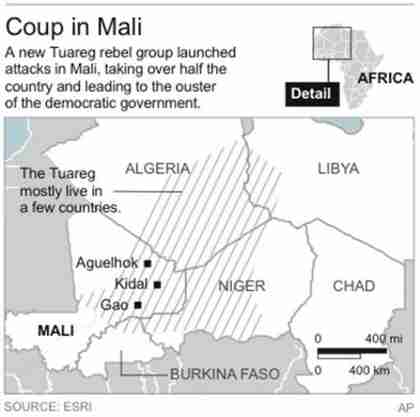 |
Events are moving quickly in the chaotic situation in Mali:
(Comments: For reader comments, questions and discussion,
see the 7-Apr-12 World View -- Tuareg rebels declare independent state of Azawad in northern Mali
thread of the Generational Dynamics forum. Comments may be
posted anonymously.)
(7-Apr-2012)
Permanent Link
Receive daily World View columns by e-mail
Donate to Generational Dynamics via PayPal
Syria crisis worsens as April 10 'peace deadline' approaches
This morning's key headlines from GenerationalDynamics.com.
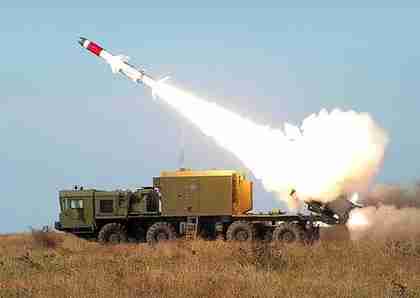 |
Russia is building up forces in the Caucasus region, preparing to protect its interests in case Israel attacks Iran with the help of the United States. The Russian military believes that when the US goes to war with Iran, it may deploy forces in friendly Georgia and warships in the Caspian Sea with the possible help of Azerbaijan. Russia is deploying guided anti-ship missiles on the Caspian shore in preparation, and is forming an offensive spearhead force, heavily armed with modern long-range weapons. In the case of an Iranian war, it's expected that the Russian spearhead will be ordered to strike south to prevent the presumed deployment of US bases in region, to link up with the troops in Armenia, and take over the South Caucasus energy corridor along which Azeri, Turkmen and, other Caspian natural gas and oil may reach European markets. By one swift military strike Russia may ensure control of all the Caucasus and the Caspian states, for the first time since the Soviet Union dissolved. Jamestown
It's like a never-ending situation comedy, where everyone is reading a script that doesn't even make sense. As I've been reporting, former U.N. Secretary-General Kofi Annan has been flying around the world selling a "six-point peace plan" that calls for a cease-fire in Syria every day for two hours. It's the silliest damn thing, but Russia and China and Syria have all agreed to it, along with an April 10 deadline to end the violence completely. I don't know if anyone seriously believes that the regime of Syria's president Bashar al-Assad has any intention of ending the violence, but no sane person does. On Thursday, current Secretary-General Ban Ki-moon said that the crisis is getting worse every day.
"Cities, towns and villages have been turned into war zones. The sources of violence are proliferating. The human rights of the Syrian people continue to be violated. ... Humanitarian needs are growing dramatically."
Kofi Annan recited the lines in his script:
"We must silence the tanks, helicopters, mortars and guns, and stop all other forms of violence too: sexual abuse, torture, executions, abductions, destruction of homes, forced displacement, and other such abuses, including on children," he said."
Well, April 10 is only four days away, and unless al-Assad really does stop the violence, Kofi Annan and the United Nations are going to be made fools of again. AP
As the Easter holiday beckons, the yields (interest rates) on Spain's bonds continued to rise on Thursday, raising concerns that "Spain is the new Greece." High bond yields indicate that investors are increasingly betting that the country is going into default. Spain's bond yields are now at their worst level since the European Central Bank (ECB) began its LTRO program on December 12, pouring over €1 trillion in liquidity into the banking system, hoping that banks would buy Spanish bonds and keep yields down. Like every one of these massive liquidity programs, this one is now failing. Bloomberg
(Comments: For reader comments, questions and discussion,
see the 6-Apr-12 World View -- Russia plans to flatten Georgia if Israel attacks Iran
thread of the Generational Dynamics forum. Comments may be
posted anonymously.)
(6-Apr-2012)
Permanent Link
Receive daily World View columns by e-mail
Donate to Generational Dynamics via PayPal
Spain is in 'extreme difficulty' and threatens renewed euro crisis
This morning's key headlines from GenerationalDynamics.com.
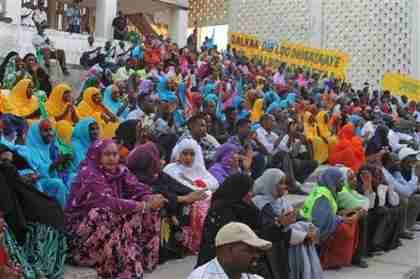 |
On Wednesday, Somalia's National Theatre was attacked by a female suicide bomber, killing ten people and wounding dozens. According to some reports, the woman was not checked for bombs because she claimed that she was pregnant. The attack was apparently meant to target Prime Minister Abdiweli Mohamed Ali, who was speaking at the event, but he was unharmed. The bombing is thought to be the work of indigenous terror group al-Shebaab, who recently announced that they were linking up with al-Qaeda. Most Somalis practice the Sufi form of Islam, and some al-Qaeda terrorists have declared that Sufism is an apostate religion. Sufi shrines have particularly been targeted by Taliban-linked terror groups in Pakistan. AP
We've seen the same thing over and over. The central government "prints" huge amounts of money and pours it into the banking system, and the pundits declare that the crisis is over. That's what happened starting in December in the European crisis, when the European Central Bank (ECB) began its Long-Term Repo Operation (LTRO). The ECB has poured an eye-watering €1.1 trillion of "printed" money into the European banking system, so that European banks could loan the money to businesses, and could drive down Spain's and Italy's bond yields (interest rates) by becoming a major purchaser of those bonds. But, as has happened every single time with one of these "nuclear options," the plan works for a while and then fails. When the LTRO began in December, Spain's bond yields fell sharply. But bond yields have been rising steadily since the beginning of March, and on Wednesday they took a sharp spike upward. Prime Minister Mariano Rajoy said on Wednesday, "Spain is facing an economic situation of extreme difficulty, I repeat, of extreme difficulty, and anyone who doesn’t understand that is fooling themselves." Bloomberg
Financial pundits on Wednesday blamed the fall in stock prices on a memo released on Tuesday by the Federal Reserve making it clear that there will be no more quantitative easing ("printing" of money). Apparently it never occurs to these pundits that if they really believe what they're saying, then they're admitting that the current stock market bubble has been CAUSED by quantitative easing, where the liquidity poured into the stock market, rather than being loaned to people and businesses. And so the obvious conclusion is that when QE ends, so does the stock market bubble.
The second interesting thing I heard from financial pundits on Wednesday is they're frustrated. After every recession in the past few decades, the economy has come roaring back, but that hasn't happened this time, and they wonder why. But as I've been saying for years, from the point of view of Generational Dynamics, nothing that's happened since the end of WW II is relevant to what's happening today. Generational theory says that the previous relevant period was the 1930s.
If you think about it, the pundits are answering their own question. They say that the economy came roaring back after earlier recessions, and that's because of the Law of Mean Reversion. If the economy has been below trend for a while, as it would be in a recession, then it should compensate by going above trend for a while.
But today it's different. As I've been pointing out for almost ten years, the stock market has been continuously above the trend value since 1995, sometimes FAR above trend value. The stock market was above trend value even during the so-called recession. (See "11-Feb-12 News -- Price/earnings ratio (valuations) trending toward collapse") So while the Law of Mean Reversion worked in favor of a roaring economy in past recessions, in this recession it predicts a stock market crash and a deflationary spiral. Wall Street Journal (Access)
The first recorded Olympic Games took place in Olympia, in ancient Greece, in 776 BC. Presumably, Greece has participated in every Olympic Games event since then, but that may come to an end this year, thanks to the debt crisis. The Greek Athletics Federation has indefinitely suspended all domestic competitions because of severe funding cuts, and may have to cancel Greece's participation in the London Olympics entirely. On May 10, Greece will hold the Olympic flame lighting ceremony in Olympia. The announced cutback will not affect the flame lighting ceremony, but will be an embarrassment to the nation. Guardian
(Comments: For reader comments, questions and discussion,
see the 5-Apr-12 World View -- Female suicide bomber attacks Somalia's National Theatre
thread of the Generational Dynamics forum. Comments may be
posted anonymously.)
(5-Apr-2012)
Permanent Link
Receive daily World View columns by e-mail
Donate to Generational Dynamics via PayPal
The logistical nightmare of leaving Afghanistan
This morning's key headlines from GenerationalDynamics.com.
 |
Even people who have never heard of Mali have usually heard of Timbuktu, or at least have heard phrases like "from here to Timbuktu." Founded between the 5th and 11th centuries by Tuareg desert nomads, Timbuktu became a meeting point between north, south and west Africa and a melting pot of black Africans, Berber, Arab and Tuareg desert nomads. The trade of gold, salt, ivory and books made it the richest region in west Africa and it attracted scholars, engineers and architects from around Africa, growing into a major centre of Islamic culture by the 14th century. Timbuktu is home to nearly 100,000 ancient manuscripts, some dating to the 12th century, preserved in family homes and private libraries under the care of religious scholars. However, the city is poor now, and is at the center of attacks by Tuareg rebels and al-Qaeda linked jihadists, while Mali itself is being governed by the head of a botched coup. (See "31-Mar-12 World View -- Timbuktu surrounded by rebels with Mali's junta government in crisis") It's feared that the violence will lead to the destruction of the manuscripts and Timbuktu’s great earthen architectural wonders. AFP
Attentive readers may recall that last week I posted a story that Azerbaijan has granted Israel access to air bases on Iran's border. Then, two days ago, I posted another story that Azerbaijan is strongly denying the story, pointing out that they have nothing to gain by giving Israel such access, and that it threatens their relationship with Turkey. Azeri president Ilham Aliyev later dismissed the speculation and said, “Azerbaijan's territory will never be used to launch an attack against its neighbor, Iran.” This situation is causing a diplomatic firestorm, as it's beginning to appear that the Obama administration purposely leaked the Azerbaijan story in order to make it more difficult for Israel to use the base as a springboard to launch an attack on Iran. (It's worth noting that a direct attack from Israel to Iran would require crossing air space monitored or controlled by the U.S., so launching from Azerbaijan would allow Israel to keep the attack secret from Washington until it's well underway.)
A new report says that the Obama administration is blaming Israel for the recent rises in gasoline prices. According to the report, the Israeli leadership believes that Obama is blaming the rising gasoline prices on "Israel's posturing" on Iran, and that the Obama administration was staging a campaign to undermine Israel. According to analyst Robert Satloff, who returned from talks with Israeli officials: “I cannot underscore how deep and visceral the [Israeli] comments of the leaking that came out of Washington were," especially because of repeated leaks by the Obama administration. Israel National News
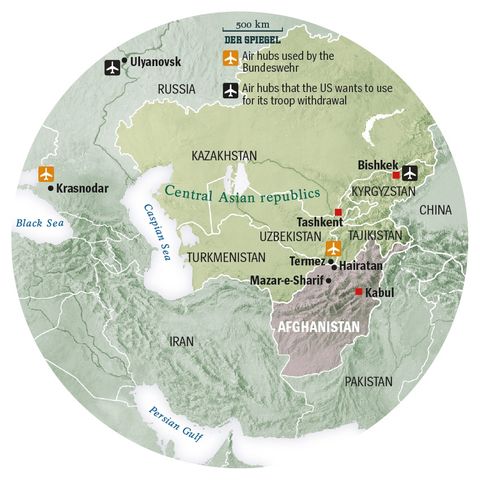 |
Nato forces are scheduled to leave Afghanistan in 2014, having failed in its mission to pacify the country, just as Russia and Britain have failed in similar missions in times past. Now the U.S. faces a logistical nightmare in transporting its troops and equipment home after ten years in the landlocked country. Transportation routes through central Asia require permission from the individual countries, and run over poor roads and bridges that provide plenty of opportunity for terrorist attacks. The U.S. would like to build a Nato base in Ulyanovsk, named after Bolshevik Revolution leader Vladimir Ilyich Lenin, whose real name was Vladimir Ilyich Ulyanov. City officials love the massive economic boost that the operation would bring to the city, but Communist Party leadership is leading a "No NATO base in Ulyanovsk!" campaign. If the massive logistical retreat fails, then large caches of weapons will be left behind in Afghanistan -- something that Russia and China do not want to see happen. Spiegel
The U.S. has previously been ordered to vacate its air transit center in Manas, Kyrgyzstan, when the current contract expires in 2014, but now Kyrgyzstan has agreed to permit the U.S. to continue using the base past 2014. The U.S. is providing substantial military assistance to Kyrgyzstan in exchange. It appears that Kyrgyzstan's change of heart came about due to the encouragement of Russia, who want the U.S. to remain in the region in order to provide stability. Jamestown
(Comments: For reader comments, questions and discussion,
see the 4-Apr-12 World View -- Timbuktu's ancient history at risk over chaotic Mali rebellion
thread of the Generational Dynamics forum. Comments may be
posted anonymously.)
(4-Apr-2012)
Permanent Link
Receive daily World View columns by e-mail
Donate to Generational Dynamics via PayPal
Pakistan will deport Osama bin Laden's wives and children
This morning's key headlines from GenerationalDynamics.com.
A Pakistani court sentenced Osama bin Laden's three widows and two of his daughters to 45 days in prison on Monday for illegally living in the country, ordering them deported when the sentence ends. Because of time served, they're expected to be in prison only two weeks. Bin Laden's favorite wife, who was about 30 years younger than he was, will return to Yemen, along with her children. However, his other two wives are Saudi citizens, and Saudi Arabia appears to be reluctant to allow them to return, presumably for fear that they could trigger al-Qaeda linked anti-government demonstrations.
One possibility is that all three wives and their children will return to Yemen together, to stay "as a family." The wives could embarrass the Pakistanis, because they may have information about how bin Laden was able to stay in Pakistan under the army's nose for ten years and nobody knew. Could there be a book deal in the offing? AP
The United States and Japan are studying counter-measures to take if North Korea goes ahead with a long-range rocket launch threatened for April 12-16. Japan says that it will shoot down the rocket if it poses a threat to its territory. The U.S. has already canceled planned food aid, but will not discuss any further repercussions if the launch takes place. My guess is that a really brutal counter-measure is planned -- namely a U.N. Security Council meeting to talk about it. AFP
The northern "Kurdistan" region of Iraq has been semi-autonomous since the days of Saddam Hussein, and the post-Saddam government made a deal with the Kurds that they would share in the oil and the revenue. But the Kurds have stopped shipping oil to Baghdad, claiming that Baghdad isn't paying for it. Baghdad is accusing the Kurds of "stealing" the oil, and selling it secretly to Iran and Turkey for a profit. Tensions between the Kurds and Baghdad began rising within two days after the American completely their withdrawal in January, when Iraqi Vice President Tareq al-Hashemi fled to the Kurdistan region to avoid being arrested by the government. Saddam was a Sunni dictator, and he violently suppressed the Shia majority, as well as the Sunni Kurds. Now there's a Shia government in charge, and tensions between them and the minority Sunnis are growing. VOA
Eurozone unemployment jumped to an all time high of 10.8%, setting a 15-year record for the single-currency area. Spain remained the worst affected, with the highest rate at 23.6%, followed by bailed-out Greece at 21%, Portugal at 15% and Ireland at 14.7%. Italy hit a record 9.3%. In another sign that recession is gripping the region, a key survey showed that manufacturing activity dropped to a three-month low in March, with the "malaise" spreading to top economies Germany and France. If you listen to CNBC or read the mainstream financial press, then you know that financial pundits are constantly predicting a return to rapid growth both in America and Europe. As I've been saying for years, this is impossible in a generational Crisis era. The Federal Reserve and the European Central Bank (ECB) have been holding off the worst by "printing" trillions of dollars and pouring into the banking systems, but no amount of "printing" is enough to stop a deflationary spiral during a generational Crisis era. There is much worse to come. AFP
Greek officials were infuriated by a statement by the German Foreign Ministry that claims arising from the Second World War Nazi occupation are "no longer an issue," since they had been settled by a 1946 agreement. Greek WWII hero Manolis Glezos (photo), said that the German statement was “historically inaccurate, false and infuriating.” He said the 1946 pact obliged Germany to pay $7 billion (in 1938 prices) as reparations and another $3.5 billion for a war loan Athens was forced to provide. Glezos said this amounts to 162 billion euros without interest today. He added that “not one mark, drachma or euro” of this money had been paid. Kathimerini
(Comments: For reader comments, questions and discussion,
see the 3-Apr-12 World View -- Greece continues to demand WW II reparations from Germany
thread of the Generational Dynamics forum. Comments may be
posted anonymously.)
(3-Apr-2012)
Permanent Link
Receive daily World View columns by e-mail
Donate to Generational Dynamics via PayPal
Generation-Xer-in-Chief versus the Supreme Court
This morning's key headlines from GenerationalDynamics.com.
 |
Three coordinated car bombings in southern Thailand killed 14 people and injured 340. The bombs targeted Saturday shoppers and a high-rise hotel frequented by foreign tourists.
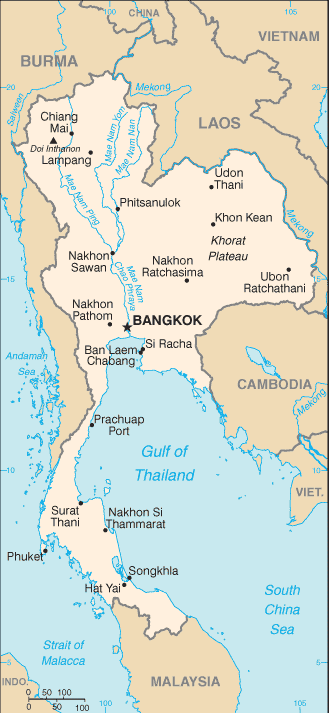 |
More than 5,000 people have been killed in Thailand's three southernmost provinces — Narathiwat, Pattani and Yala — since an Islamist insurgency flared in January 2004, but this is the worst attack in years. Unlike the norther region, the southern region of Thailand has a heavily Muslim population, influenced by the connection with Malaysia. Bangkok Post and AP
A story last week that Azerbaijan has granted Israel access to air bases on Iran's border is being strongly denied by Azerbaijan's military and political analysts. The Azerbaijanis point out that they have nothing to gain by giving Israel such access, and that it threatens their relationship with Turkey. They suggest that Israel is leaking false information in order to advance its own agenda with Iran. EurasiaNet
In a joint press conference on Saturday with Saudi Arabia's Foreign Minister Saud Al-Faisal, U.S. Secretary of State Hillary Clinton voiced a U.S. commitment to defend GCC states against any threats, particularly from Iran. The Gulf Cooperation Council (GCC), comprising Kuwait, Saudi Arabia, the UAE, Qatar, Bahrain and Oman, was founded in the early 1980s, in the shadow of the Iran/Iraq war. According to Clinton, the US wants to cooperate with the GCC "to take practical and specific steps to strengthen our mutual security, such as helping our militaries improve interoperability, cooperate on maritime security and missile defense, and coordinate responses to crises." She explained that could help the GCC states build a "regional missile defense architecture" against what they see as a looming ballistic missile threat from Iran. Kuna (Kuwait)
I'm not a constitutional law professor like President Barack Obama or all the Generation-X brainiacs on his staff, so I was surprised by how weak the Administration's case was in support of "ObamaCare," as I listened to the audio from the hearings. According to the commentators, some of the liberal judges had to provide advice to the Administration lawyers so that they wouldn't make complete fools of themselves.
As I've described several times since 2009, my objections to the "ObamaCare" health care bill are, first, because of the widespread fraud and extortion related to passage and implementation of the bill, and, second, because the whole thing is a proposal of economic insanity, because it was just like President Nixon's 1970s wage-price controls, which ended up in total disaster for the country.
This should be a lesson to Generation-Xers who make life decisions based on their hatred of Boomers. In the past few years, I've documented many cases where Gen-Xers have destroyed themselves and their organizations by following policies based on hatred of Boomers. The worst, of course, was the entire financial crisis, caused by Gen-X banksters knowingly creating tens of trillions of dollars of toxic synthetic securities and defrauding the loathesome Boomer investors with them, just to get even with them for the Nasdaq crash in 2000. Many of those banksters have lost their homes and fortunes, as they deserve. And many have lost their families as well.
I first wrote about Barack Obama in 2007, in "Barack Obama to Boomers: Drop dead!" In that article, I quoted Obama as expressing his contempt for Boomers. During his presidential campaign, I've been extremely critical of the ridiculous promises that he made, just as I'm critical of all politicians these days. He said in 2008, "This was the moment when the rise of the oceans began to slow and our planet began to heal." He would be guided by facts, not like President Bush, who was guided by ideology and ignored facts. He would cure global warming, close Guantanamo, become friendly with Iran and North Korea, bring a two-state solution to Palestinians and Israelis, beat the Taliban and al-Qaeda, end the financial crisis, reflate the real estate and stock market bubbles and, of course, provide universal health care. He has not achieved a single one of these objectives, and many of them are total failures. If the Supreme Court rules as expected, that will be the next one.
As I keep saying, any organization that bases its policies on hatred of one-third of the population is a danger to itself, to the nation, and to the world. If you want to know why policies of the Generation-Xer-in-Chief have failed so many times, that would be the reason. Politico
 |
Ethnic Tuareg rebels, fighting under the banner of the Mouvement National de Libération de l'Azawad (MNLA), captured Kidal and Gao in the last two days, and then rapidly crossed the desert and captured the historic city of Timbuktu, effectively cutting the country in half, with the Tuaregs in control of the north, which they call Azawad. The MNLA leaders claim that all they want is an independent homeland, and want nothing to do with al-Qaeda. But they're backed by Islamist fighters from Al-Qaeda in the Islamic Maghreb (AQIM), who have jihadist intentions and who, more than anything else, would like to establish a Sunni Islamic state. The government of Mali is in total chaos, following a coup by disgruntled army soldiers ten days ago, and their neighbors have threatened them with sanctions. Facing disaster, the leader of the coup announced on Sunday that he wants to step down and restore democracy, if only his neighbors would help him defeat the MNLA. Will the Tuaregs next be headed south to capture the capital city, Bamako? They haven't said. Al-Jazeera
(Comments: For reader comments, questions and discussion,
see the 2-Apr-12 World View -- Coordinated bombings in southern Thailand kill 14, injure hundreds
thread of the Generational Dynamics forum. Comments may be
posted anonymously.)
(2-Apr-2012)
Permanent Link
Receive daily World View columns by e-mail
Donate to Generational Dynamics via PayPal
Politicians try to fool all of the people all of the time.
This morning's key headlines from GenerationalDynamics.com.
 |
On this April Fool's day, our theme is smoke and mirrors. Everyone's talking about a peace plan for Syria, even though no one except the stupidest politician could possibly believe that it's serious. And the Europeans have been fabricating a new bailout fund, trying to stop Spain from going the way of Greece. Add that to the usual crap that we hear out of Washington, on Wall Street, and in other world centers, and you have a truly demoralizing situation. April Fool!
The AP story says, "The [Syrian] Foreign Ministry statement raised serious doubts about whether Annan's plan to end the conflict will even get off the ground." Duh. The statement that led to this startling conclusion is that Syria's Bashar al-Assad regime will not pull tanks and troops from towns and cities engulfed by unrest before life returns to normal there.
"[The military is in populated areas] in a state of self defense and protecting civilians. The Syrian army is not happy to be present in residential areas. Once peace and security prevail in these areas, the army will not stay nor wait for Kofi Annan to leave. This is a Syrian matter. ...The battle to bring down the state in Syria has already ended and the battle of reinforcing stability has started."
The regime of president Bashar al-Assad won't stop slaughtering civilians until the opposition gives up, and the opposition won't give up until al-Assad steps down. Russia and Iran are supplying weapons and support to Assad, while Iraq and China are indirectly supporting him. Saudi Arabia and Qatar would like to arm the opposition in order to force al-Assad to step down. AP
Angel Gurria, the secretary general of the Organization for Economic Co-operation and Development (OECD) called on the Europeans to come with €1 trillion for a bailout fund. He said,
"When dealing with markets you must overshoot expectations. "The mother of all firewalls should be in place, strong enough, broad enough, deep enough, tall enough, just BIG."
Spurred on by the OECD demand to create the "mother of all firewalls," the euro finance ministers met on Friday and supposedly increased the euro bailout fund to €800 billion, but several analysts are pointing out that it's the usual political scam.
We are always amazed how news organisations dutifully report the line peddled by eurozone officials that they are about to double the ceiling of the firewall, when it fact they are not -- not even close. The story this morning [Friday] is about a tentative agreement at today's Ecofin in Copenhagen, which includes several elements -- the ESM size, the funds committed by the EFSF, the non-committed funds, and a gradual built-in of ESM capital. The key point is that one cannot add the ESM's total of €500bn, plus the existing programmes and commitments of €200bn, plus the EFSF unused capacity of €240bn together. The agreement now subject to negotiation earmarks the €240bn as an emergency slush fund for one year only, and whose release would require unanimity. Once again, Angela Merkel gets it exactly like she wants to -- the ESM runs at €500bn, plus the existing programmes. Not a penny more. And once the programmes expire, we are back to €500bn.Furthermore, the ESM is not going to be active at €500bn right away -- so the €240bn scam at most hides the year one shortfall. From July 2012 to June 2013, the total capacity -- including the slush fund -- will be €640bn, in year two it will be €600bn, in year three €700bn, and then it will gradually fall back towards €500bn, as the existing loans are paid back. In other words, the capacity of the rescue fund will initially oscillate above, and later converge to €500bn. The agreement essentially means that the eurozone has rejected an effective increase in the ESM. That would be our headline on the story -- not 'Eurozone doubles size of ESM.'"
"Accounting Devices and Fiscal Illusions," a staff discussion note by Timothy C. Irwin of the International Monetary Fund (IMF), provides a list of the accounting devices that governments use to lie about finances. The paper gives a list of these fraudulent accounting devices, along with dozens of examples of governments that have been using these devices. Here are some excerpts:
"A TAXONOMY OF ACCOUNTING DEVICESThe essence of an accounting device is to improve headline fiscal indicators without actually improving public finances, or without improving them to the extent suggested by the headline indicators. A device aimed at the deficit reduces this year’s deficit, but increases future deficits by an amount that largely or wholly offsets the initial improvement. To do this, it must either increase reported revenue or decrease reported spending in the year (or years) of interest. And, in return, it either decreases reported revenue or increases reported spending in future years. ...
The first accounting device, hidden borrowing, increases reported revenue now but increases reported spending later. In Europe, governments are able to reduce their headline deficits by taking over pensions schemes of private companies or public enterprises. The obligations to make future pension payments do not count as liabilities, so when governments take over the pensions in return for compensating payments, the compensating payments count as revenue.4 The government of Portugal used this device to reduce its reported deficit in both 2010 and 2011, as well as in earlier years. But it is not alone. ...
The second accounting device, disinvestment, increases reported revenue now and reduces reported revenue in the future. Under some cash-accounting standards, the proceeds of privatization are revenues that reduce the deficit. But if the sale deprives the government of future dividends its true fiscal benefit may be much smaller than its reported effect. ...
The third accounting device, deferred spending, reduces reported spending now, but increases it later. In the United States, the government has met predominantly cash-based targets for the deficit by postponing a military payday by a single day ... and by deferring Medicare payments that would have been made in the last week of the year. ...
The fourth accounting device, foregone investment, reduces reported spending now but reduces reported revenue later. When governments want new infrastructure to be built, they sometimes use concessions, a kind of public-private partnership in which the private company undertakes an investment under a long-term contract with the government, but receives its revenue from users. For example, since the early 1990s, much investment in public infrastructure in Chile has come from concessions for airports, toll roads, and other projects; total investment has amounted to some $7 billion or 4 percent of current GDP. These arrangements reduce the measured deficit in the years in which investment takes place, but increase it later, compared with what would have happened if the government had group method, which takes account of future as well as past and present employees, is equivalent to 44 percent of GDP (Government of France, 2011, p. 167). 11 financed the investment and then collected the tolls itself. (The Chilean government has also granted minimum-revenue guarantees to many of the concessionaires.) ...
A common way to reduce the reported deficit and debt in the short term is to have spending undertaken by a public entity that is not counted as part of the government for reporting purposes. Often the spending involves an investment, but one whose future profitability is doubtful. If the investment is unsuccessful, its cost may show up later either in the receipt of smaller dividends from the entity (foregone investment) or in the need to grant it greater subsidies (deferred spending). ...
As governments come under greater pressure to cut both costs and spending, more and more responsibility is being pushed down to the sub-sovereign level, to quasi-government bodies, municipalities and regional governments. Government-owned entities and their debt are being deconsolidated."
Back in 2004, someone online asked me, "How can you ever be proven wrong? You're predicting a financial crisis, and if it doesn't happen, then you just say it hasn't happened yet." My response at that time was, "Public debt has been increasing exponentially. If it ever starts leveling off and falling, then you can tell me I'm wrong."
What all these accounting devices have in common is that they increase public debt. All we hear from politicians and analysts is that the fault is with the markets, and if we create the "The mother of all firewalls," then the markets will be "convinced," and we can all go back to a real estate bubble and a credit bubble, to support the current stock market bubble. The Law of Mean Reversion says that they're wrong, as I've described in detail many times. International Monetary Fund (PDF)
(Comments: For reader comments, questions and discussion,
see the 1-Apr-12 World View -- Smoke and mirrors in the Syrian peace plan and the 'Mother of all Firewalls'
thread of the Generational Dynamics forum. Comments may be
posted anonymously.)
(1-Apr-2012)
Permanent Link
Receive daily World View columns by e-mail
Donate to Generational Dynamics via PayPal
Web Log Summary - 2016
Web Log Summary - 2015
Web Log Summary - 2014
Web Log Summary - 2013
Web Log Summary - 2012
Web Log Summary - 2011
Web Log Summary - 2010
Web Log Summary - 2009
Web Log Summary - 2008
Web Log Summary - 2007
Web Log Summary - 2006
Web Log Summary - 2005
Web Log Summary - 2004
Web Log - December, 2016
Web Log - November, 2016
Web Log - October, 2016
Web Log - September, 2016
Web Log - August, 2016
Web Log - July, 2016
Web Log - June, 2016
Web Log - May, 2016
Web Log - April, 2016
Web Log - March, 2016
Web Log - February, 2016
Web Log - January, 2016
Web Log - December, 2015
Web Log - November, 2015
Web Log - October, 2015
Web Log - September, 2015
Web Log - August, 2015
Web Log - July, 2015
Web Log - June, 2015
Web Log - May, 2015
Web Log - April, 2015
Web Log - March, 2015
Web Log - February, 2015
Web Log - January, 2015
Web Log - December, 2014
Web Log - November, 2014
Web Log - October, 2014
Web Log - September, 2014
Web Log - August, 2014
Web Log - July, 2014
Web Log - June, 2014
Web Log - May, 2014
Web Log - April, 2014
Web Log - March, 2014
Web Log - February, 2014
Web Log - January, 2014
Web Log - December, 2013
Web Log - November, 2013
Web Log - October, 2013
Web Log - September, 2013
Web Log - August, 2013
Web Log - July, 2013
Web Log - June, 2013
Web Log - May, 2013
Web Log - April, 2013
Web Log - March, 2013
Web Log - February, 2013
Web Log - January, 2013
Web Log - December, 2012
Web Log - November, 2012
Web Log - October, 2012
Web Log - September, 2012
Web Log - August, 2012
Web Log - July, 2012
Web Log - June, 2012
Web Log - May, 2012
Web Log - April, 2012
Web Log - March, 2012
Web Log - February, 2012
Web Log - January, 2012
Web Log - December, 2011
Web Log - November, 2011
Web Log - October, 2011
Web Log - September, 2011
Web Log - August, 2011
Web Log - July, 2011
Web Log - June, 2011
Web Log - May, 2011
Web Log - April, 2011
Web Log - March, 2011
Web Log - February, 2011
Web Log - January, 2011
Web Log - December, 2010
Web Log - November, 2010
Web Log - October, 2010
Web Log - September, 2010
Web Log - August, 2010
Web Log - July, 2010
Web Log - June, 2010
Web Log - May, 2010
Web Log - April, 2010
Web Log - March, 2010
Web Log - February, 2010
Web Log - January, 2010
Web Log - December, 2009
Web Log - November, 2009
Web Log - October, 2009
Web Log - September, 2009
Web Log - August, 2009
Web Log - July, 2009
Web Log - June, 2009
Web Log - May, 2009
Web Log - April, 2009
Web Log - March, 2009
Web Log - February, 2009
Web Log - January, 2009
Web Log - December, 2008
Web Log - November, 2008
Web Log - October, 2008
Web Log - September, 2008
Web Log - August, 2008
Web Log - July, 2008
Web Log - June, 2008
Web Log - May, 2008
Web Log - April, 2008
Web Log - March, 2008
Web Log - February, 2008
Web Log - January, 2008
Web Log - December, 2007
Web Log - November, 2007
Web Log - October, 2007
Web Log - September, 2007
Web Log - August, 2007
Web Log - July, 2007
Web Log - June, 2007
Web Log - May, 2007
Web Log - April, 2007
Web Log - March, 2007
Web Log - February, 2007
Web Log - January, 2007
Web Log - December, 2006
Web Log - November, 2006
Web Log - October, 2006
Web Log - September, 2006
Web Log - August, 2006
Web Log - July, 2006
Web Log - June, 2006
Web Log - May, 2006
Web Log - April, 2006
Web Log - March, 2006
Web Log - February, 2006
Web Log - January, 2006
Web Log - December, 2005
Web Log - November, 2005
Web Log - October, 2005
Web Log - September, 2005
Web Log - August, 2005
Web Log - July, 2005
Web Log - June, 2005
Web Log - May, 2005
Web Log - April, 2005
Web Log - March, 2005
Web Log - February, 2005
Web Log - January, 2005
Web Log - December, 2004
Web Log - November, 2004
Web Log - October, 2004
Web Log - September, 2004
Web Log - August, 2004
Web Log - July, 2004
Web Log - June, 2004